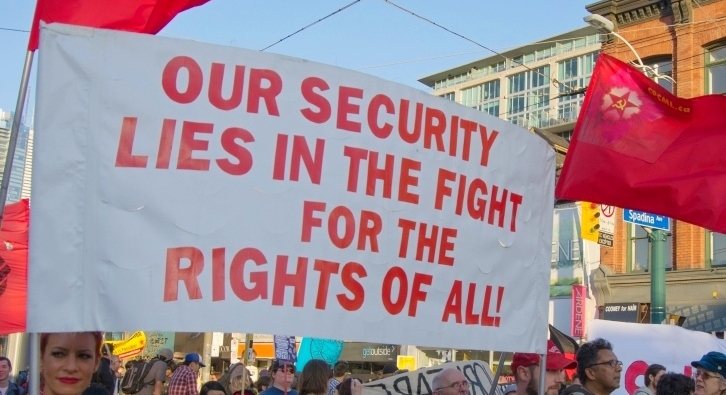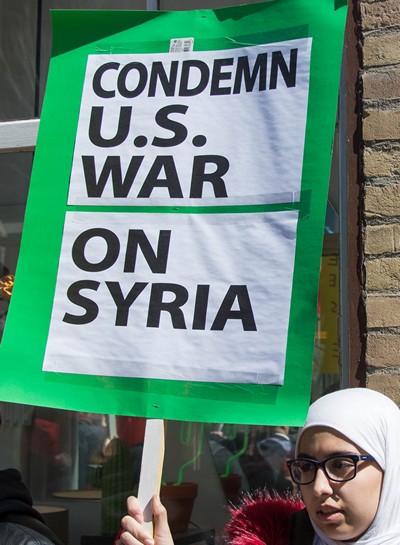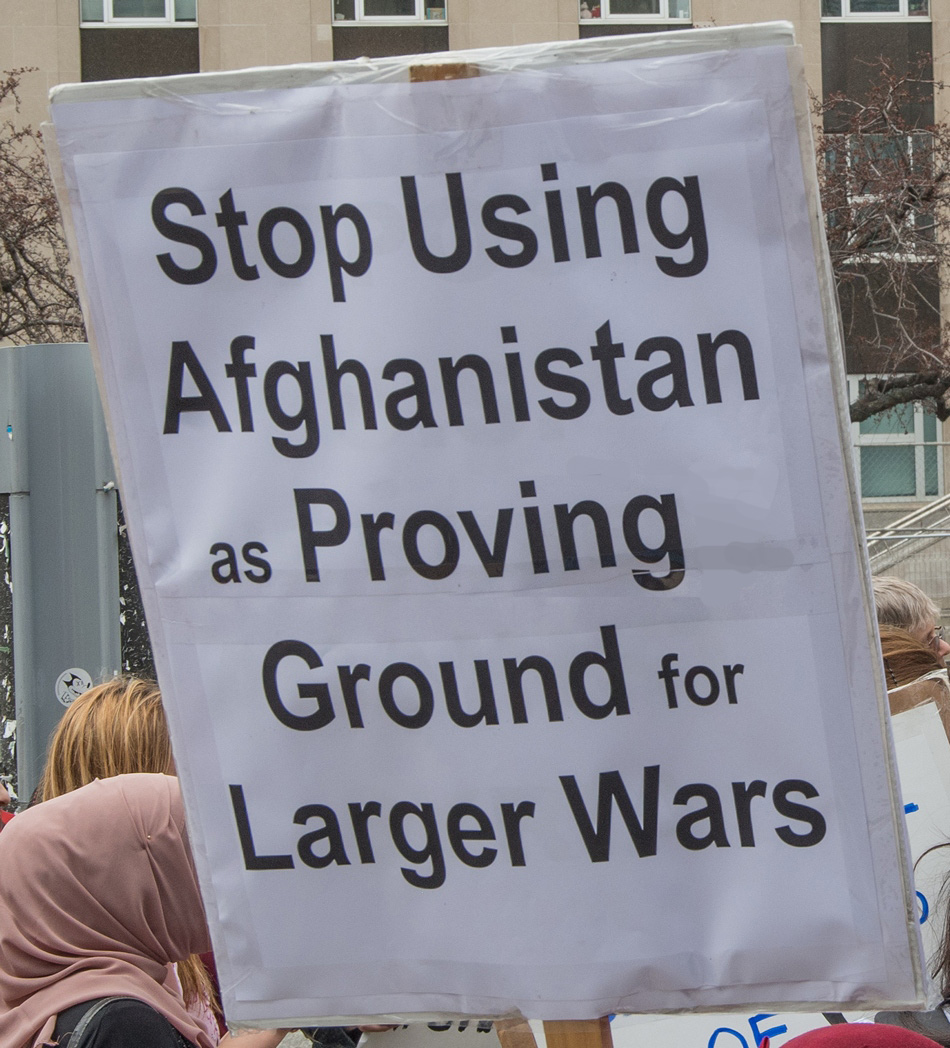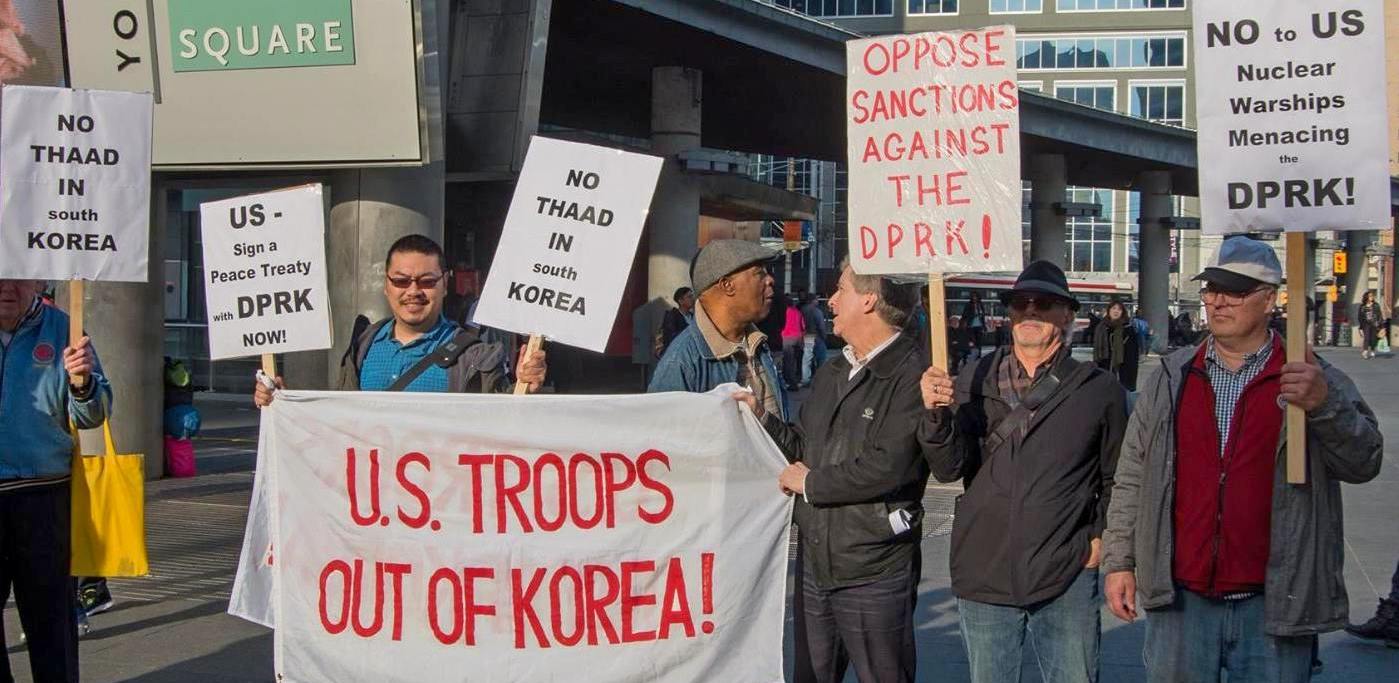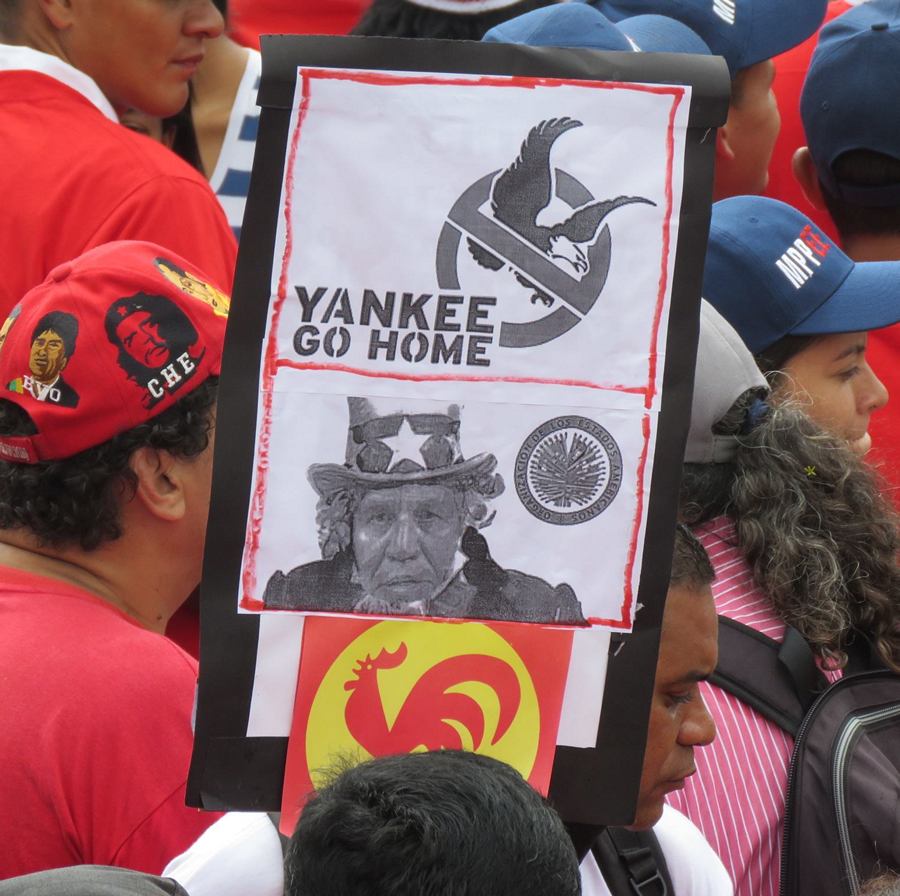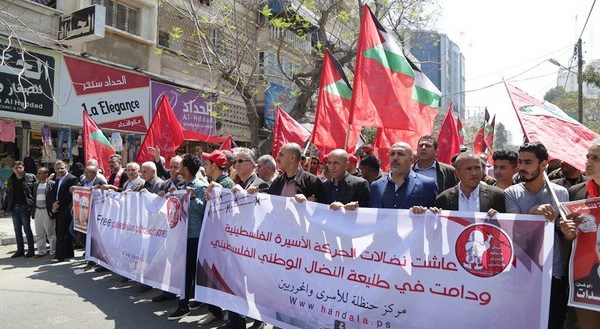
|
April 22, 2017 - No. 14 Our Security Lies
in Our Fight • Manufactured
Justifications
for
Use
of
Police
Powers
U.S. Intelligence Failures Our Security Lies in Our Fight for the Rights of All!Contradictions within the ranks of the U.S. bureaucracy have increased manifold since Donald Trump became President of the United States. Evidence of the failure of U.S. intelligence agencies to provide information which is trustworthy is sharpening these contradictions. One or another or all of the 17 U.S. intelligence agencies were accused of interfering in the presidential election while not a few military figures also spoke in favour of either the Clinton camp or the Trump camp. Both political parties, the Democrats and the Republicans, have been accused of spying on one another and/or of collaborating with Russian spying. The Russians have also been accused of interfering in the U.S. electoral process. Cabinet leaks, accusations of White House spying or of the intelligence agencies spying on the White House are rife while accusations of false information emanating from the intelligence agencies is released from within their own ranks.
The latest accusations that the intelligence agencies are providing false intelligence and that the U.S. presidency is not basing its actions on trustworthy intelligence relate to the accusations that the Syrian government used chemical weapons against civilians on April 4. This is countered by several former military and intelligence figures who, using inside channels, are corroborating the Russian version of events that the Syrian government did not carry out such an attack. According to some accounts, Trump's CIA Director himself, Mike Pompeo, tried to warn the President of the intelligence failure on Syria before the U.S. airstrike and was then subsequently sidelined by the "hawks" and did not appear in the "war room" at the President's private Florida estate when the missile strike was conducted.[1] To have this account by one section of the "intelligence community" against the account of the other is supposed to get the peace-loving people who oppose what the Trump administration and other governments are doing to engage in the factional fighting taking place within the ranks of the ruling elites.[2] It is also to further divert attention from the deep crisis in which the U.S. democratic institutions are mired and the dangers posed by government of police powers. The revelations of the former intelligence officers also show that the aggression against Syria did not unite the U.S. bureaucracy as intended. The material provided by TML Weekly this week shows that as the divisions within the ranks of the ruling elite and its intelligence agencies continue to sharpen, the dangers to the peoples of the world increase. Two days after the U.S. strike, the U.S. military's Pacific Command announced the deployment of an aircraft carrier, warships and submarines to Korean waters to threaten the People's Republic of China and the Democratic People's Republic of Korea as well as to contain Russia. Then, on April 13, for the same purposes, the U.S. attacked Afghanistan with the first use of what is known as a GBU-43/B Massive Ordnance Air Blast Bomb, a 21,600-pound device we are told is "America's most powerful non-nuclear bomb." Despite the massive intelligence failures, the peoples of the world are supposed to entrust their fate and protection to the very same security agencies, intelligence agencies, police and armed forces that either provide the false intelligence or base their actions on it. It is not only irrational but also a desperate attempt to keep the peoples disarmed in the face of the situation. Such a path is fraught with danger. In the opinion of TML Weekly, far from the peoples basing their stand on what the U.S. imperialists and other big powers say and on false and self-serving intelligence, it is necessary to take a clear look at the results of the contention for power among the private interests which have seized the U.S. state apparatus and that of their NATO allies and draw warranted conclusions. The developments taking place inform the resistance movements of the people to base themselves on their own independent collective intelligence based on their own collective experience. The security of the peoples of the world lies in the fight for their own rights and the rights of all.
Notes
|
|
On April 17, U.S. Vice President Michael Pence visited
the Demilitarized Zone (DMZ) on the border of north and south Korea at
the same time that a U.S. nuclear carrier group -- including an
aircraft carrier, destroyers and cruisers -- is headed for Korean
waters and expected to arrive at the end of April. At a joint press
conference with south Korea's acting president, Hwang Kyo-ahn (a
loyalist of impeached president Park Geun-hye) Pence stated:
"We hope to achieve this objective [of denuclearization
of north Korea]
through peaceful means but all options are on the table.
"Just in the past two weeks, the world witnessed the strength and
resolve of our new president in actions taken in Syria and Afghanistan.
North Korea would do well not to test his resolve, or the strength of
the armed forces of the United States in this region.
"[...] we will defeat any attack and we will meet any use of
conventional or nuclear weapons with an overwhelming and effective
response."
With evangelical fervour, Pence stated, "Let me assure you that under President Trump's leadership our resolve has never been stronger, our commitment to this historic alliance with the courageous people of South Korea has never been stronger and with your help and God's help freedom will ever prevail on this peninsula." Pence also spoke of his father's participation as a U.S. soldier in the Korean War for which he earned a Bronze Star. "I think, in some way, my Dad just might be smiling from heaven to see the sacrifices that he and other American soldiers and South Korean soldiers made here are now passed on to my generation. That's not changed our commitment to the security and prosperity of South Korea," he said.
|
|
The same day, Kim In Ryong, the Deputy Ambassador to the United Nations of the Democratic People's Republic of Korea (DPRK) held a news conference stating the desire of the DPRK for a peace treaty with the U.S. to end the Korean War and hostility against the north. Deputy Ambassador Kim reiterated that if the U.S. "dares opt for a military option" that the DPRK "is ready to react to any mode of war desired by the U.S." He pointed out that the decision of the Trump administration to deploy its carrier strike group to Korean waters showed that the U.S. reckless moves towards invading Korea have once again reached a serious phase.
Kim noted in response to reporters' questions that missile launches conducted by the DPRK are part of the normal process of a country building up its defensive capacity. He noted that similar launches by south Korea, Japan and other countries are ignored by the UN Security Council and big powers. The "precondition to solving all the problems in the Korean Peninsula" is rolling back U.S. hostility, the ambassador said. Kim also rejected the decision to hold a meeting of the UN Security Council on April 28 on the DPRK's nuclear program, calling it "another abuse of authority" by the U.S. The DPRK's own requests for meetings on the issue of Korea have been ignored, he said.
Kim reiterated two proposals supported by China for de-escalating the situation that have also been ignored by the U.S.: denuclearization of the Korean peninsula based on signing a peace treaty to end the Korean War; and a freeze on U.S.-south Korean military exercises in exchange for a freeze on DPRK missile tests and nuclear development.
U.S. President Trump on April 13 tweeted, "I have great confidence that China will properly deal with North Korea. If they are unable to do so, the U.S., with its allies, will!"
An editorial in China's Global Times newspaper on April 18 stated, "Beijing will cooperate with Washington and stick to its own principles. [...] However, cooperative efforts by China and the US will under no circumstance evolve into any kind of military action against North Korea. Beijing will never support or cooperate with Washington when it comes to implementing solutions that involve using military force against Pyongyang. Nor will Beijing support increasing measures from Washington that involve the direct overthrow of the Pyongyang regime."
The Global Times editorial continued: "If [a
U.S.]
blow [against the DPRK] is heavy, the Chinese people will not
allow their government to remain passive when the armies of the
US and South Korea start a war and try to take down the Pyongyang
regime. The Chinese will not let something like that happen,
especially on the same land where the Chinese Volunteer Army once
fought in the early 1950s. It is a land covered with the blood of
Chinese soldiers who bravely fought in the early 1950s." The
editorial also stated that China is willing to impose further
sanctions against the DPRK, and that "the denuclearization of
North Korea is a priority that sits above all of its other
interests."
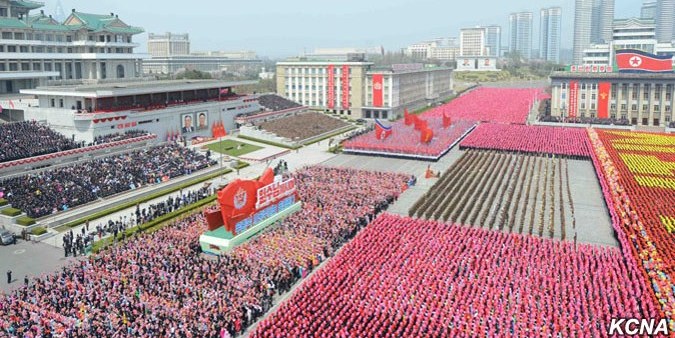
April 15, 2017, DPRK celebrates 105th anniversary of the birth of the
country's
founder President Kim Il Sung.
Inside the DPRK, April 15 was filled with celebrations
of the 105th anniversary of the birth of the country's founder
President Kim Il Sung. Choe Ryong Hae, member of the Presidium of the
Political Bureau of the Workers' Party of Korea (WPK) Central
Committee, spoke at the main rally in Pyongyang. He noted that the U.S.
is "resorting to frantic nuclear war provocations against the DPRK."
Choe stated that a pre-emptive U.S. attack of any sort, nuclear or
otherwise, will be met with a response in kind from the DPRK.
U.S. threats have been accompanied by media reports
painting
the DPRK as unwilling to negotiate and irrational. In a
characteristic example, Victor Cha, the Korea Chair at the Center
for Strategic and International Studies, told NBC News, "The
leadership in North Korea has shown absolutely no sign or
interest in diplomacy or dialogue with any of the countries
involved in this issue." U.S. Congressman Mac Thornberry told Fox
News on April 16 that the DPRK is "not interested in
negotiation." Gordon Chang, an anti-DPRK, anti-China U.S.
academic has been quoted in several media outlets explaining that
all of the U.S. attempts at negotiations to date have been
futile, covering up that it has been the U.S. which violated the
spirit and letter of each one.
On April 20, a U.S. resolution at the UN Security
Council
condemning an alleged missile test conducted by the DPRK failed
as a result of Russia's veto. According to Russia's Permanent
Mission to the UN, the U.S. refused to include language in the
resolution stipulating that the situation on the Korean peninsula
be resolved through dialogue. The Russian mission stated that the
U.S. refused to accede to its request to include such language in
the motion, and then when the resolution failed to pass pointed to the
vote as
another example of Russia "blocking" the security council.
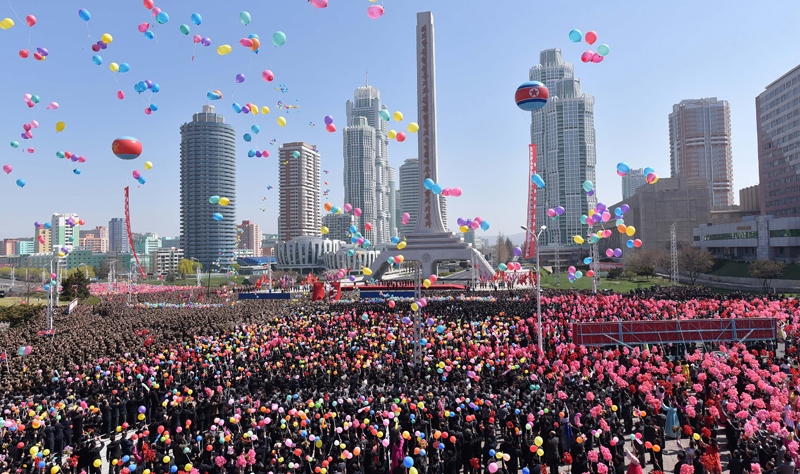
Despite U.S. disinformation as well as the brutal sanctions it imposes
on the country, the DPRK strives to provide a prosperous life for its
people. On April 13, the country's leadership joined
by local residents inaugurated the new "Ryomyong" (dawn) apartment
block of public housing
in the capital, Pyongyang (pictured). The complex includes a 70-storey
skyscraper
incorporating solar and geothermal technology and green roofs and
walls, dozens more apartment buildings or housing units, six schools,
three kindergartens and three nurseries. Construction on the project
was completed in just under one year.
Contradictions Sharpen Within U.S. Bureaucracy
Over Chemical Attack
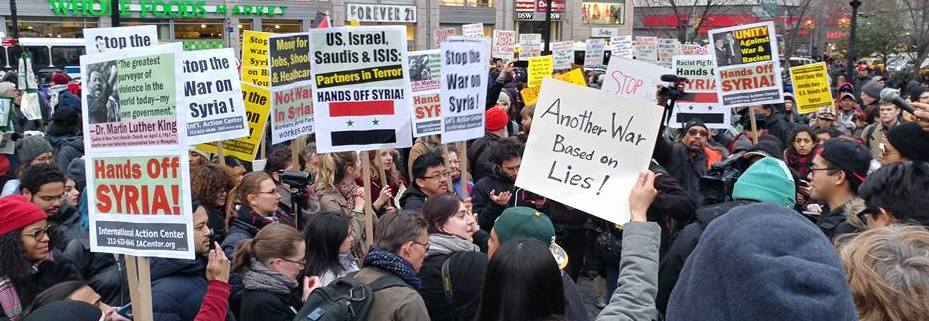
New York rally against U.S. missile strikes on Syria, April 7, 2017. (G. Butterfield)
Opposition to the Trump administration's fraudulent pretext for launching an airstrike against Syria on April 6 continues from within the ranks of U.S. experts, military and political figures. The Trump administration's position was repeated in a four-page document issued on April 11 in which the White House laid out its case for Syrian culpability in civilian deaths due to use of chemical weapons by Syrian forces on April 4 in Idlib province.[1]
MIT Professor Emeritus of Science, Technology, and International Security Theodore Postol called the White House document "an obviously false, misleading and amateurish intelligence report." Postol stated that the document "does not provide any evidence whatsoever that the U.S. government has concrete knowledge that the government of Syria was the source of the chemical attack." It "contains absolutely no evidence that this attack was the result of a munition being dropped from an aircraft. In fact, the report contains absolutely no evidence that would indicate who was the perpetrator of this atrocity," he said.[2] In a subsequent detailed analysis of the alleged impact site of the attack, Postol refuted the U.S. administration claims and stated, "No competent intelligence professional would have made so many false claims that are totally inconsistent with the evidence."[3]
Also commenting on the report to media, Phyllis Bennis of the Institute for Policy Studies think-tank noted that the report "does not provide anything close to proof, or even evidence, of the who, the what or the how of the chemical attack."[4]
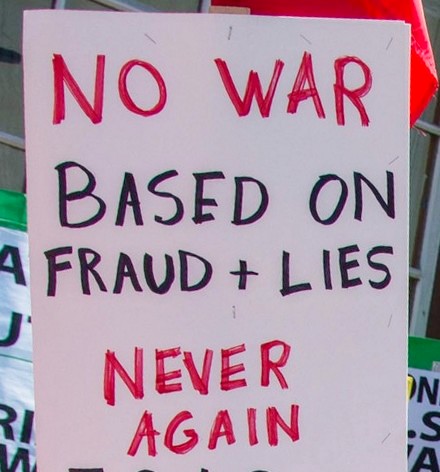
Many within and on the fringes of the U.S. "intelligence community" are also disagreeing with the official U.S. position and taking positions that coincide with the explanation given by the Syrian and Russian governments, that deadly chemicals were unwittingly dispersed when Syrian jets struck a terrorist facility containing said chemicals. Along with leaks that contradict the official U.S. position, this paints the picture of a split within the U.S. bureaucracy.
This explanation exculpating the Syrian government was previously given by former senior military intelligence officer Colonel W. Patrick Lang on April 7.[5] The same explanation was given by Col. Lawrence Wilkerson, former Chief of Staff to Colin Powell (who broke with Powell following disagreement over the claims on which the 2003 Iraq war was based) in an April 7 interview on the Real News Network. "I don't think [the Trump administration] cared [what the intelligence showed]. I think they were looking for a provocation. This one was suitable, and so they acted," he said.
Wilkerson gave his opinion that an aim of the strikes was to give the U.S. additional leverage in any settlement of the conflict through negotiations:
"In fact, most of my sources are telling me, including members of the team that monitors global chemical weapons, including people in Syria, including people in the U.S. intelligence community, that what most likely happened -- and this intelligence, by the way, was shared with the United States by Russia, in accordance with the deconfliction agreement we have with Russia -- [is] that [the Syrians] hit a warehouse that they had intended to hit. They told both sides, Russia and the United States, they were going to hit [it].
"This warehouse was alleged to have ISIS supplies in it, and indeed it probably did, and some of those supplies were precursors for chemicals. Or, possibly an alternative, they were phosphates for fertilizing the cotton-growing region that's adjacent to this area. The bombs hit, conventional bombs hit the warehouse, and because of a very strong wind, and because of the explosive power of the bombs, they dispersed these ingredients and killed some people."[6]
Journalist Robert Parry, writing for Consortium News on April 8 stated, "a source told me that [CIA Director Mike Pompeo] had personally briefed Trump on April 6 about the CIA's belief that Syrian President Bashar al-Assad was likely not responsible for the lethal poison-gas incident in northern Syria two days earlier" and that subsequently Pompeo and other intelligence figures were not included in the decision-making or actual launch of missiles on April 6.[7]
Philip Giraldi, a former counter-terrorism specialist and military intelligence officer for the CIA, appearing on the Scott Norton Show radio program on April 6, stated:
"I'm hearing from sources on the ground in the Middle East, people who are intimately familiar with the intelligence that is available who are saying that the essential narrative that we're all hearing about the Syrian government or the Russians using chemical weapons on innocent civilians is a sham.
"The intelligence confirms pretty much the account that the Russians have been giving which is that they hit a warehouse where the rebels -- now these are rebels that are, of course, connected with Al Qaeda -- where the rebels were storing chemicals of their own and it basically caused an explosion that resulted in the casualties. Apparently the intelligence on this is very clear."
A memorandum to President Trump issued on April 11 by Veteran Intelligence Professionals for Sanity (VIPS), a group founded in January 2003 to oppose the spurious claims used to justify war on Iraq, provided similar conclusions. "Our U.S. Army contacts in the area have told us this is not what happened. There was no Syrian 'chemical weapons attack.' Instead, a Syrian aircraft bombed an al-Qaeda-in-Syria ammunition depot that turned out to be full of noxious chemicals and a strong wind blew the chemical-laden cloud over a nearby village where many consequently died," the VIPS statement said.[8]
Scott Ritter, former UN weapons inspector in Iraq from 1991 to 1998, in an April 12 article criticized the White House intelligence claims and the justification for the U.S. strike:
"The Pentagon eventually produced what it claimed to be a radar track of a Syrian aircraft, believed to be an SU-22 fighter bomber, that took off from Shayrat airbase and was over Khan Shaykhun at the time of the alleged chemical attack. This radar track was produced in conjunction with what [National Security Advisor H.R.] McMaster called 'our friends and partners and allies around the world,' but most likely derived from a NATO AWACS reconnaissance aircraft flying over Turkey at the time. According to other U.S. military sources, the same system used to track the SU-22 aircraft also detected the release of weapons, and the impact of these weapons on the ground, using infrared (IR) sensors that detected the heat signatures associated with both events.
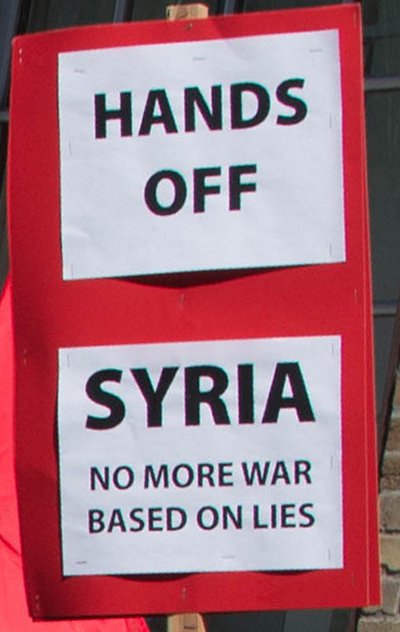
"According to McMaster, the intelligence linking this documented airstrike to the chemical incident in Khan Shaykhun was drawn exclusively from images released by rebel-affiliated media activists, including the 'White Helmets,' and from media reports about observed symptoms by medical personnel who claimed contact with the victims. At this point, there is no evidence the U.S. intelligence community used any independent information to corroborate the reports out of Syria. Instead, a combination of images and alleged eyewitness accounts from persons under the exclusive control of Tahrir al-Sham [the new name by which the Al-Nusra Front, an Al-Qaeda affiliate is known] and medical evaluation of persons presented to medical authorities by Tahrir al-Sham 'confirmed' the use of a nerve agent."
Ritter adds that "the evidence seems to corroborate Syrian and Russian claims that the SU-22 aircraft used against Khan Shaykhun employed conventional weapons, and not the chemical weapons the rebels claimed. ... [I]t is physically impossible for a chemical weapon to produce the impact IR signatures detected by the U.S. and linked to the Khan Shaykhun attack. ... The IR data collected by the U.S., when combined with the rebel eyewitness statements and video, provides unequivocal corroboration of the Syrian government's claim that it employed conventional weapons against Khan Shaykhun.
Ritter noted that the type of rockets used by Syria's SU-22 aircraft are "ill-suited for chemical weapons deployment. There is no evidence that either the S-8 or S-24 rockets have ever been fitted with a chemical warhead. For the U.S. case to hold any water, Syria would have had to undertake a covert weapons development program that designed, developed and produced a new class of chemical warhead possessing zero military value (the small amount of agent able to be carried, combined with the high impact speeds, makes no military sense)."
Ritter also noted that the "open source reporting" from social media that the U.S. claims rely on in fact contradict the idea that sarin was used. While victims spoke of a "yellow-blue" smoke and pungent odour, sarin is colourless and odourless, he stated. Furthermore, "Any rescuer who handled contaminated persons in the manner shown on the 'White Helmet' video would themselves become victims," he said. Ritter argued that "Russian claims [that Syria's bombing that day hit a terrorist weapons depot containing chemical substances] remain the only viable possibility, and as such should be worthy of the kind of international investigation being called for by Russia and Syria, but opposed by the United States." Ritter also stated that the widely-cited image of a crater allegedly resulting from the Syrian chemical attack can be shown to be unrelated to the April 4 bombings and "consistent with the impact of a high explosive warhead from a mortar or air-to-surface rocket."[9]
Notes
1. The main claims of the April 11 White House report are:
- "personnel historically associated with Syria's chemical weapons program" were at the bombed Shayrat Airfield in late March and on April 6;
- "accounts of victims presenting symptoms consistent with sarin exposure, such as frothing at the nose and mouth, twitching, and pinpoint pupils. This constellation of symptoms is inconsistent with exposure to a respiratory irritant like chlorine;" "Local physicians posted videos specifically pointing out constricted pupils (a telltale symptom of nerve agent exposure), medical staff with body suits on, and treatments involving atropine, which is an antidote for nerve agents such as sarin;"
- any fabrication of reports, footage or evidence "would have required a highly organized campaign to deceive multiple media outlets and human rights organizations while evading detection;"
- "Amnesty International said evidence pointed to an
air-launched chemical attack;"
- "Doctors Without Borders said that
medical teams...found symptoms to be consistent with exposure to
a neurotoxic agent such as sarin;"
- "Laboratory analysis of
physiological samples collected from multiple victims detected
signatures of the nerve agent sarin;"
- "Further, the World Heath
Organization stated on April 5 that its analysis of the victims
of the attack in Syria showed they had been exposed to nerve
agents, citing the absence of external injuries and deaths due to
suffocation."
The Doctors Without Borders and World Health Organization statements are here misquoted or selectively quoted by the White House.
In a reversal of its prior position, the U.S. government now claims that Syria's chemical weapons were not in fact destroyed and the Syrian government "maintains the capability and intent to use chemical weapons..."
The report is based on "signals intelligence and geospatial intelligence, laboratory analysis of physiological samples collected from multiple victims, as well as a significant body of credible open source reporting," the latter referring to social media posts. No evidence is presented, only a "summary" of U.S. conclusions.
2. Theodore A. Postol, "A Quick Turnaround Assessment of the White House Intelligence Report Issued on April 11, 2017."
Also see, on the 2013 U.S. allegations, "Possible Implications of Faulty US Technical Intelligence in the Damascus Nerve Agent Attack of August 21, 2013" by former UN Weapons Inspector Richard Lloyd and MIT Professor of Science, Technology and National Security Policy Theodore A. Postol, published January 14, 2014. And Robert Parry, "New York Times Retreats on 2013 Syria-Sarin Claims," Consortium News, April 6, 2017.
3. Theodore A. Postol "The Nerve Gas Attack Described in White House Report Did Not Occur, Expert Says of Syria Incident," Truthdig, April 19, 2017.
4. Steven Rosenfeld, "Trump's missile attack on Syria was justified with fake intelligence: experts," Alternet, April 18, 2017.
"Donald Trump's decision to launch cruise missile strikes on a Syrian Air Force Base was based on a lie. In the coming days the American people will learn that the Intelligence Community knew that Syria did not drop a military chemical weapon on innocent civilians in Idlib. Here is what happened:
"1. The Russians briefed the United States on the proposed target. This is a process that started more than two months ago. There is a dedicated phone line that is being used to coordinate and deconflict (i.e., prevent U.S. and Russian air assets from shooting at each other) the upcoming operation.
"2. The United States was fully briefed on the fact that there was a target in Idlib that the Russians believed was a weapons/explosives depot for Islamic rebels.
"3. The Syrian Air Force hit the target with conventional weapons. All involved expected to see a massive secondary explosion. That did not happen. Instead, smoke, chemical smoke, began billowing from the site. It turns out that the Islamic rebels used that site to store chemicals, not sarin, that were deadly. The chemicals included organic phosphates and chlorine and they followed the wind and killed civilians.
"4. There was a strong wind blowing that day and the cloud was driven to a nearby village and caused casualties.
"5. We know it was not sarin. How? Very simple. The so-called 'first responders' handled the victims without gloves. If this had been sarin they would have died. Sarin on the skin will kill you. How do I know? I went through 'Live Agent' training at Fort McClellan in Alabama.
"There are members of the U.S. military who were aware this strike would occur and it was recorded. There is a film record. At least the Defense Intelligence Agency knows that this was not a chemical weapon attack. In fact, Syrian military chemical weapons were destroyed with the help of Russia."
See "Make Canada a Zone for Peace!" TML Weekly, April 8, 2017.
6. "Wilkerson: Trump Attack on Syria Driven by Domestic Politics," Real News Network, April 7, 2017.
7. Robert Parry, "Where Was CIA's Pompeo on Syria?" Consortium News, April 8, 2017.
8. The statement was signed by:
- Eugene D. Betit, Intelligence Analyst, DIA, Soviet
FAO, (U.S.
Army, ret.);
- William Binney, Technical Director, NSA;
co-founder, SIGINT Automation Research Center (ret.);
- Marshall
Carter-Tripp, Foreign Service Officer and former Office Director
in the State Department Bureau of Intelligence and Research,
(ret.);
- Thomas Drake, Senior Executive Service, NSA (former);
-
Robert Furukawa, Capt, CEC, USN-R, (ret.);
- Philip Giraldi, CIA,
Operations Officer (ret.);
- Mike Gravel, former Adjutant, top
secret control officer, Communications Intelligence Service;
special agent of the Counter Intelligence Corps and former United
States Senator;
- Matthew Hoh, former Capt., USMC, Iraq and
Foreign Service Officer, Afghanistan (associate VIPS);
- Larry C.
Johnson, CIA & State Department (ret.);
- Michael S. Kearns,
Captain, USAF (Ret.); ex-Master SERE Instructor for Strategic
Reconnaissance Operations (NSA/DIA) and Special Mission Units
(JSOC);
- John Brady Kiesling, Foreign Service Officer (ret.);
-
John Kiriakou, former CIA analyst and counterterrorism officer,
and former senior investigator, Senate Foreign Relations
Committee;
- Linda Lewis, WMD preparedness policy analyst, USDA
(ret.) (associate VIPS);
- David MacMichael, National
Intelligence Council (ret.);
- Ray McGovern, former U.S. Army
infantry/intelligence officer and CIA analyst (ret.);
- Elizabeth
Murray, Deputy National Intelligence Officer for Near East, CIA
and National Intelligence Council (ret.);
- Torin Nelson, former
Intelligence Officer/Interrogator, Department of the Army;
- Todd
E. Pierce, MAJ, U.S. Army Judge Advocate (Ret.);
- Coleen Rowley,
FBI Special Agent and former Minneapolis Division Legal Counsel
(ret.);
- Scott Ritter, former MAJ., USMC, and former UN Weapon
Inspector, Iraq;
- Peter Van Buren, U.S. Department of State,
Foreign Service Officer (ret.) (associate VIPS);
- Kirk Wiebe,
former Senior Analyst, SIGINT Automation Research Center, NSA;
-
Robert Wing, former Foreign Service Officer (associate VIPS);
-
Ann Wright, U.S. Army Reserve Colonel (ret) and former U.S.
Diplomat.
9. Scott Ritter, "Dereliction of Duty, Redux," Truthdig, April 12, 2017.
International Actions Condemn U.S. Bombing of Afghanistan
Hands Off Afghanistan! NATO Out of Afghanistan!
End the Occupation Now!
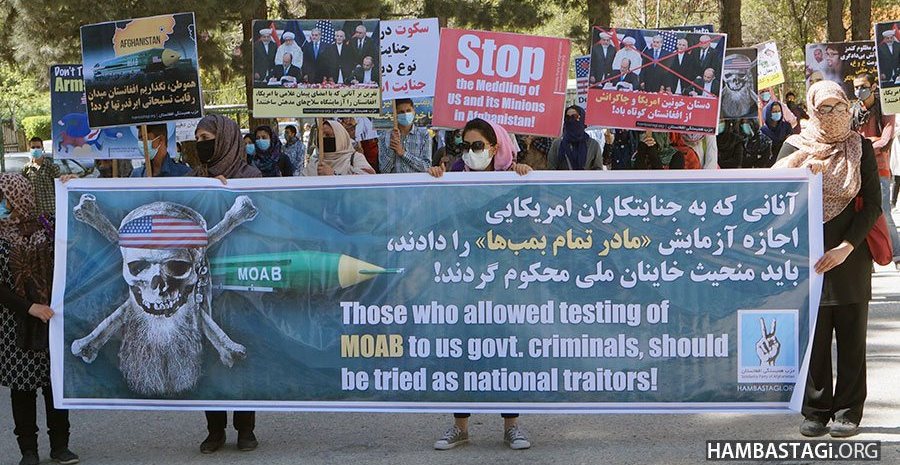
On April 13, the U.S. dropped its massive ordnance air blast (MOAB) bomb, aka the "mother of all bombs," in the Achin district of Nangarhar province in Afghanistan, using the pretext that it was necessary to destroy a network of underground tunnels used by terrorists.[1]
Emergency anti-war protests beginning on April 14 took place around the world -- in Kabul, Afghanistan as well as in the U.S. cities of Boston; Minneapolis; New York City; Washington, DC; Los Angeles; in Toronto, Canada; London, UK and Vienna, Austria. Many of these were organized by youth in those countries who are part of the Afghan diaspora, as well as anti-war and rights organizations. TML Weekly is posting below photos from those actions.
Referring
to
the
MOAB,
an
April
14
statement
issued
by
Afghans
United
for
Justice
pointed out:
"The bomb is not just a weapon to target people underground. It is a tool for psychological warfare. It is a weapon of mass destruction. It is a blast that destroys whatever is in its path for miles and causes severe hearing damage. At the time of this writing, an ongoing fire still rages due to the blast.
"Along with the short-term damage and injury, Nangarhar province will be affected for generations to come from the toxic effects left behind by the bomb in its air, water, and soil. War is an environmental and health issue that affects us all. Our entire planet is saturated by toxins due to these bombings in the long term because we share the same atmosphere.
"Though the U.S. military, in collaboration with the Afghan government, claimed to target only ISIS operatives, the truth is that the innocent people living in Nangarhar will endure the effects of this bomb for decades to come. [...]
"This bomb, like the drones, air strikes, night raids, and the destruction that came before it, is used as a tool for warfare that prevents the stability of people living in provinces all across the country. We must demand accountability for this war crime. Afghans have suffered 16 years of this so-called 'War on Terror' illegally waged by the US and its allies. This war has worsened the chances for world peace. The MOAB was nicknamed as the 'Mother Of All Bombs' but there is nothing mothering about this or any bomb. Mothering is about reproducing and protecting life -- not killing and destroying it.
"In 2016, when President Obama was still in office, the U.S. dropped at least 1,337 bombs on Afghanistan, while the international community claimed the country was safe and forced thousands of refugees to return. And since Donald Trump took office, there were more than 150 strikes dropped on Afghanistan, with more than 100 airstrikes in just the first two weeks of April. The use of the MOAB bomb signals an escalation in an already protracted and vicious war that has cost Afghans their homeland."
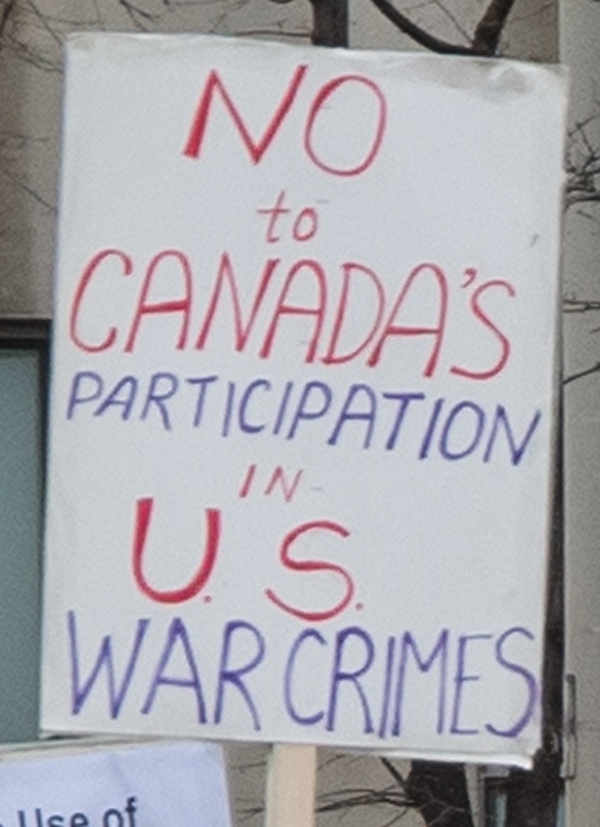
The Afghan Overseas Student Network issued a call to action in response to the use of the MOAB and the increased danger of war that could lead to humanity's extinction. The students firmly rejected the dehumanization of the Afghan people and the ongoing U.S./NATO imperialist occupation of their homeland, saying in part:
"The recent launch of the horrendous 'MOAB' bomb by the Trump cabinet was an insult to us and to the lives of millions of Afghans who have been dehumanized for many years by the illegitimate U.S. actions in waging war in Afghanistan. The Afghan people have been decimated for many years but the recent use of the MOAB weapon in the Achin district of Nangarhar made us think our human lives are not important. [...]
"Today we ask all the U.S. citizens to hold the U.S. government accountable for their immoral act of war. Your tax money could be used better in helping the lives of millions of people in this world rather than spending it on wars for the benefit of profiteers. The effect of three decades of war is what the U.S. military wanted to inflict upon the lives of ordinary citizens in Afghanistan and that's to promote panic, insecurity, fear and anger that has devastated the lives of our people. Today every Afghan family is tired of wars and we ask all of you to stop the aggression of U.S. imperialist war. Today we cannot go back to our normal life, while thinking of our families and people who are trapped under U.S. strikes. There are 100 unreported cases of U.S. drone attacks in the South and North part of Afghanistan as Afghanistan is called the Mother of Drones attacks. The world is apparently just watching!!!"
Kabul, Afghanistan

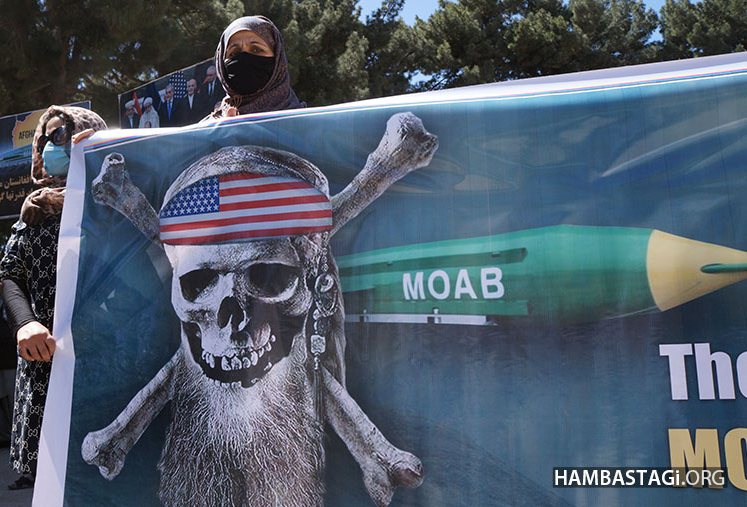
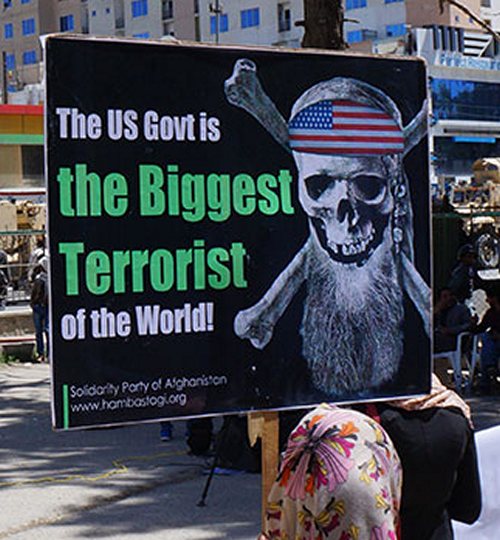
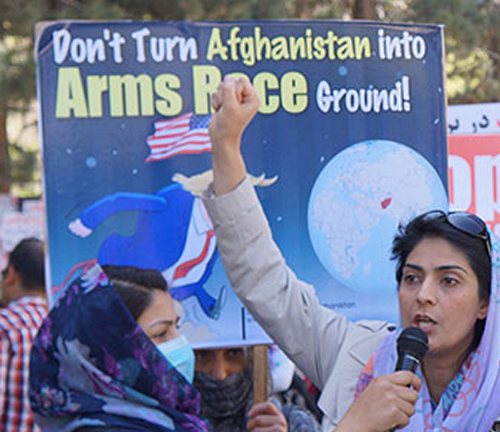
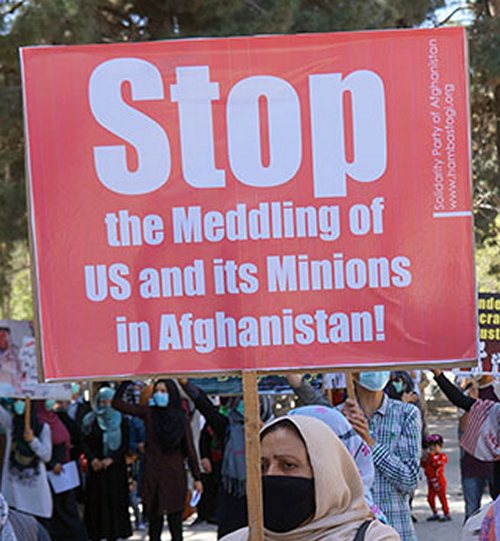

Toronto

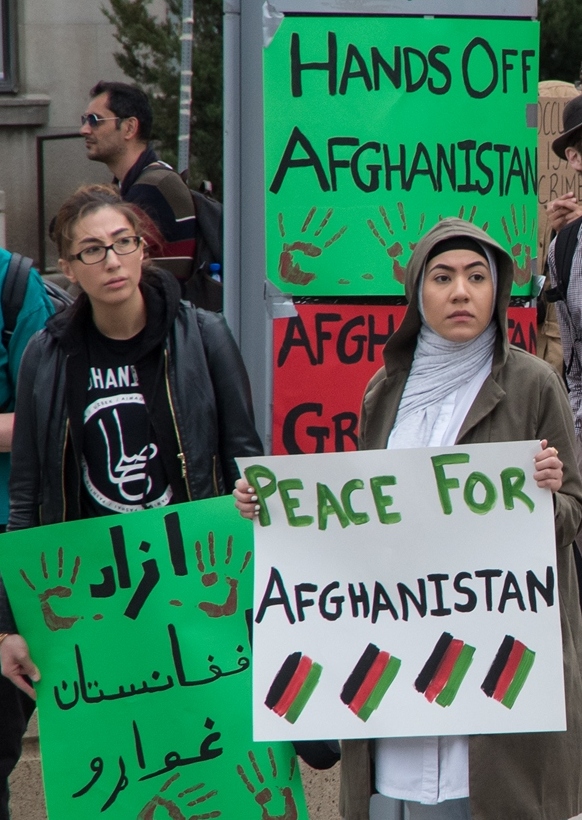
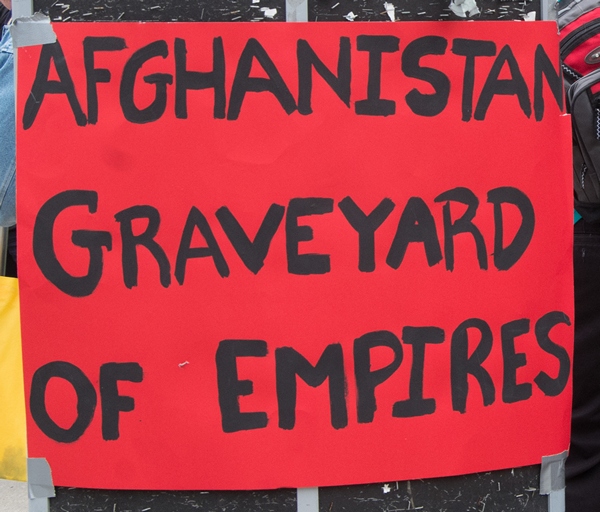
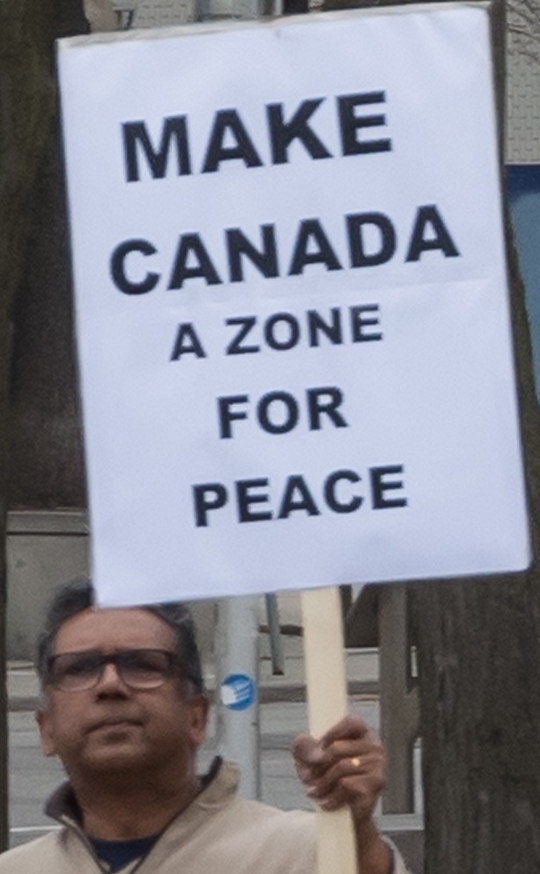
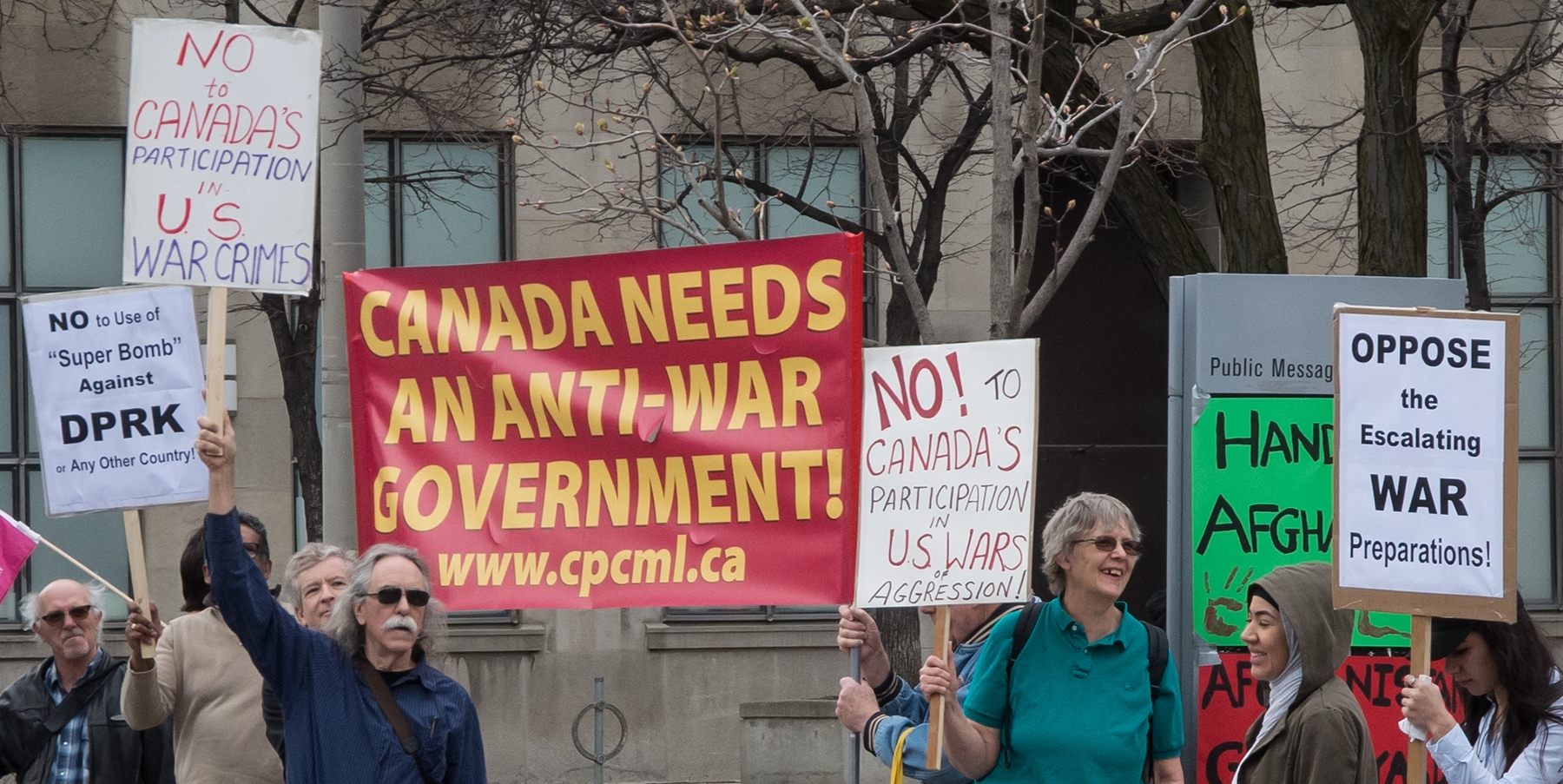
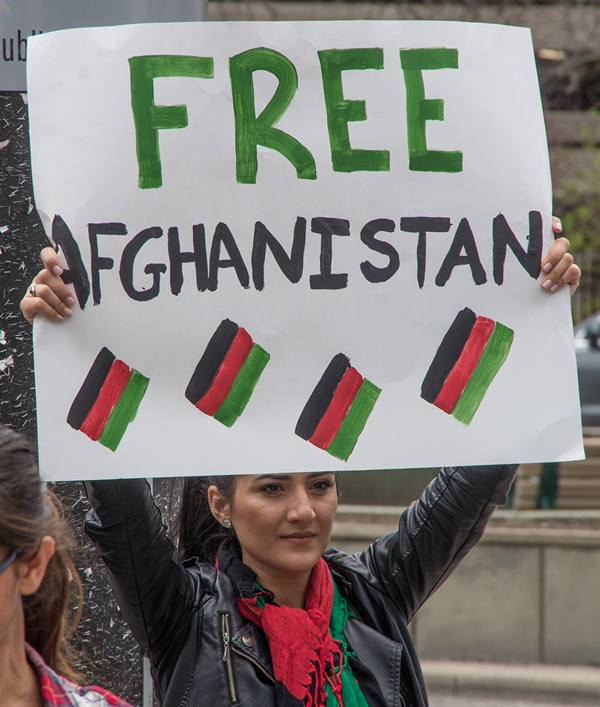
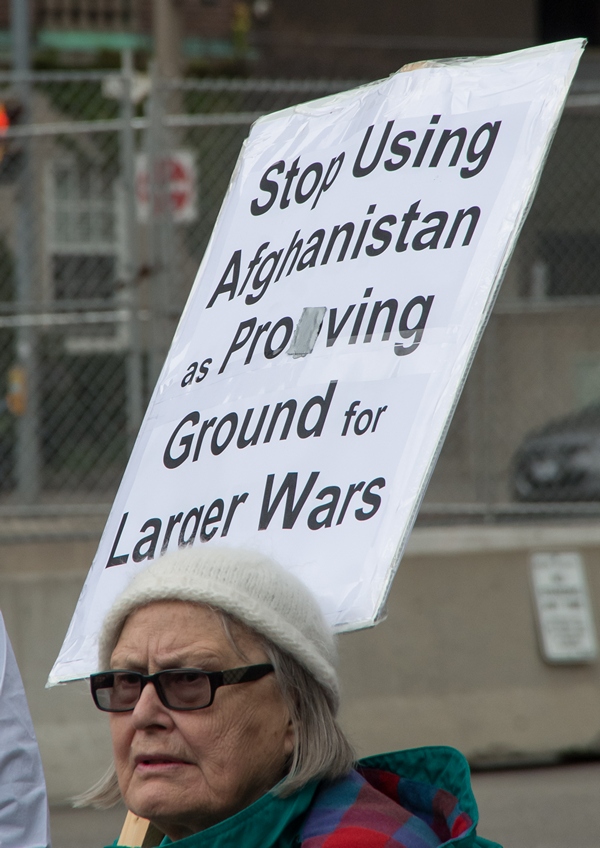
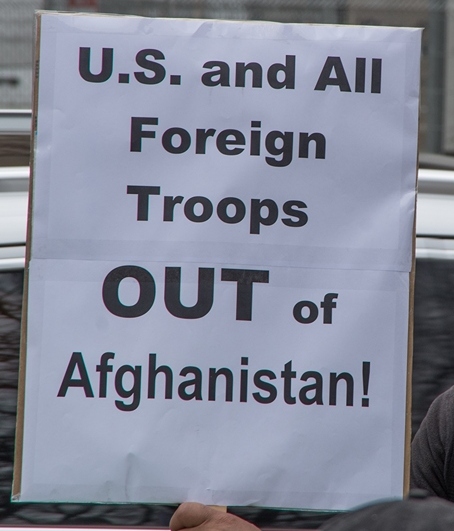
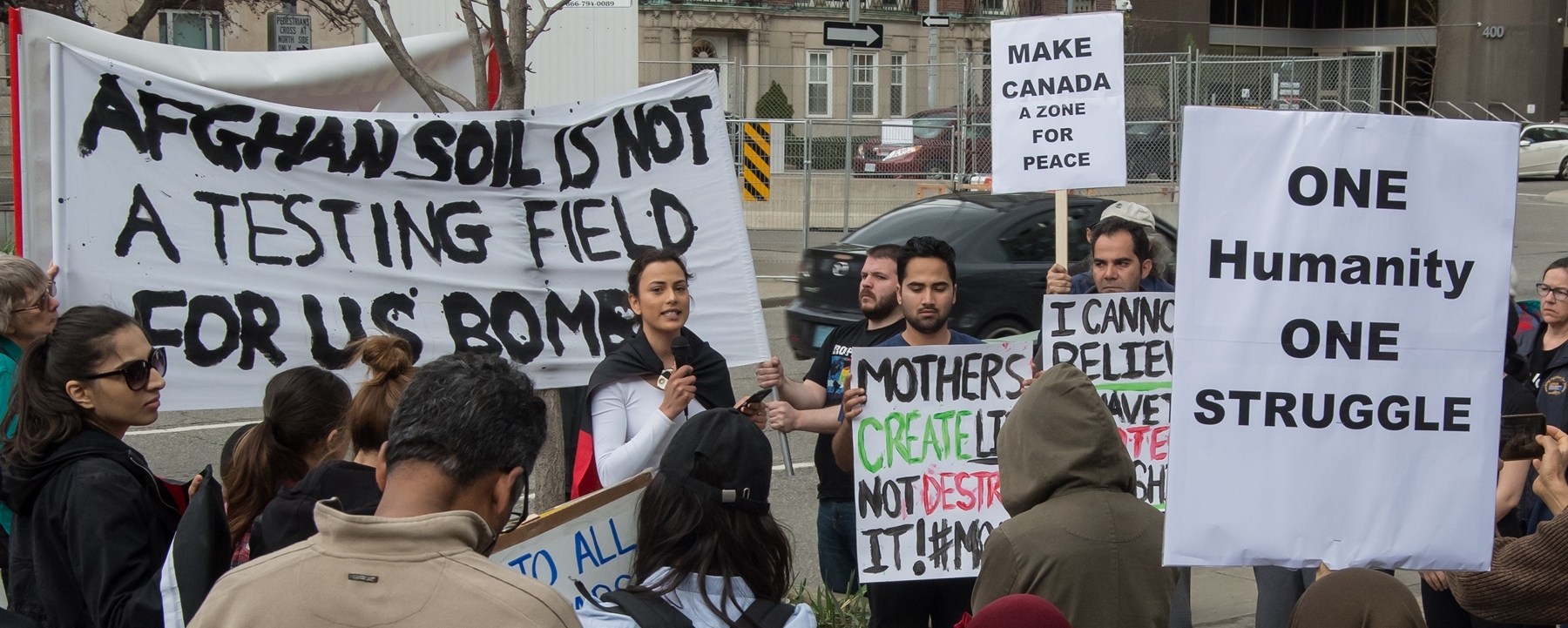
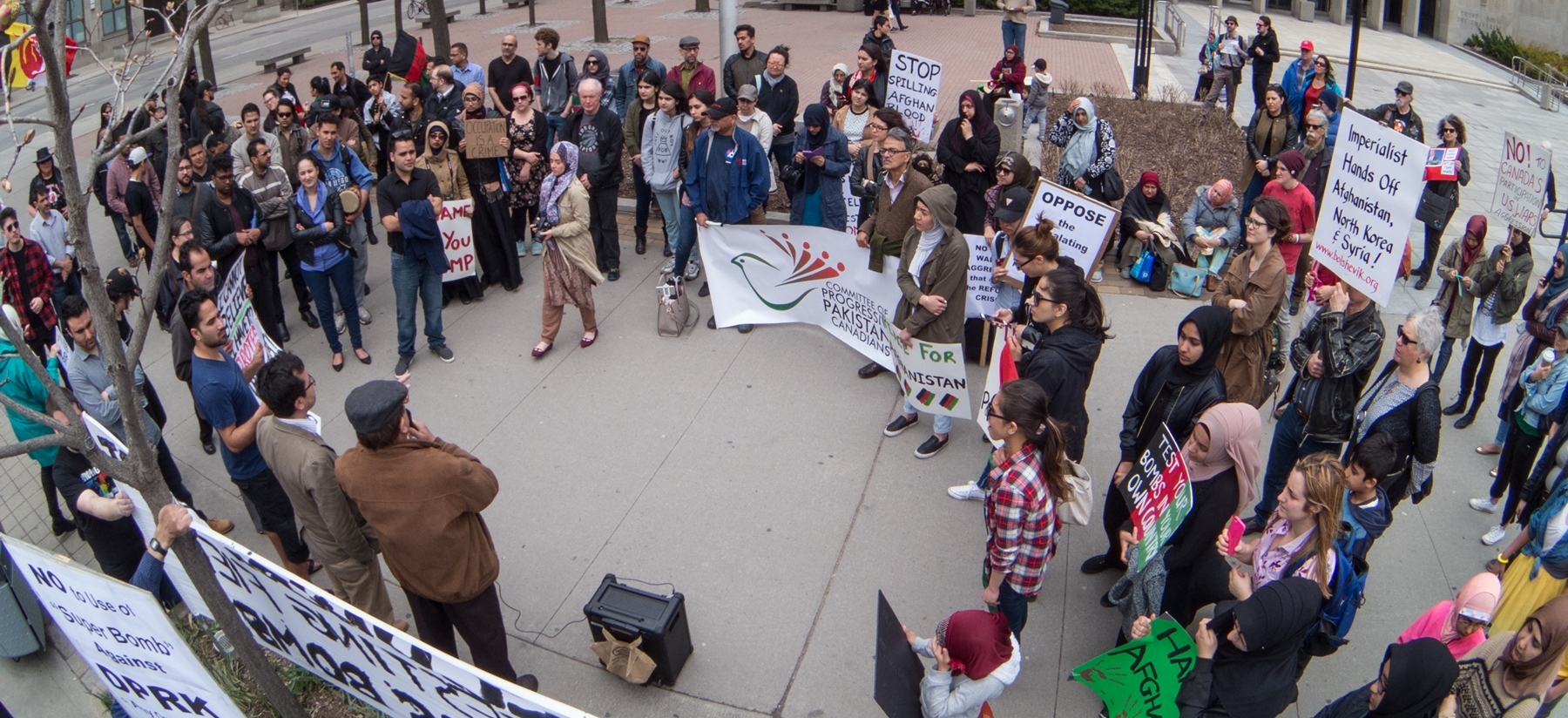
United States
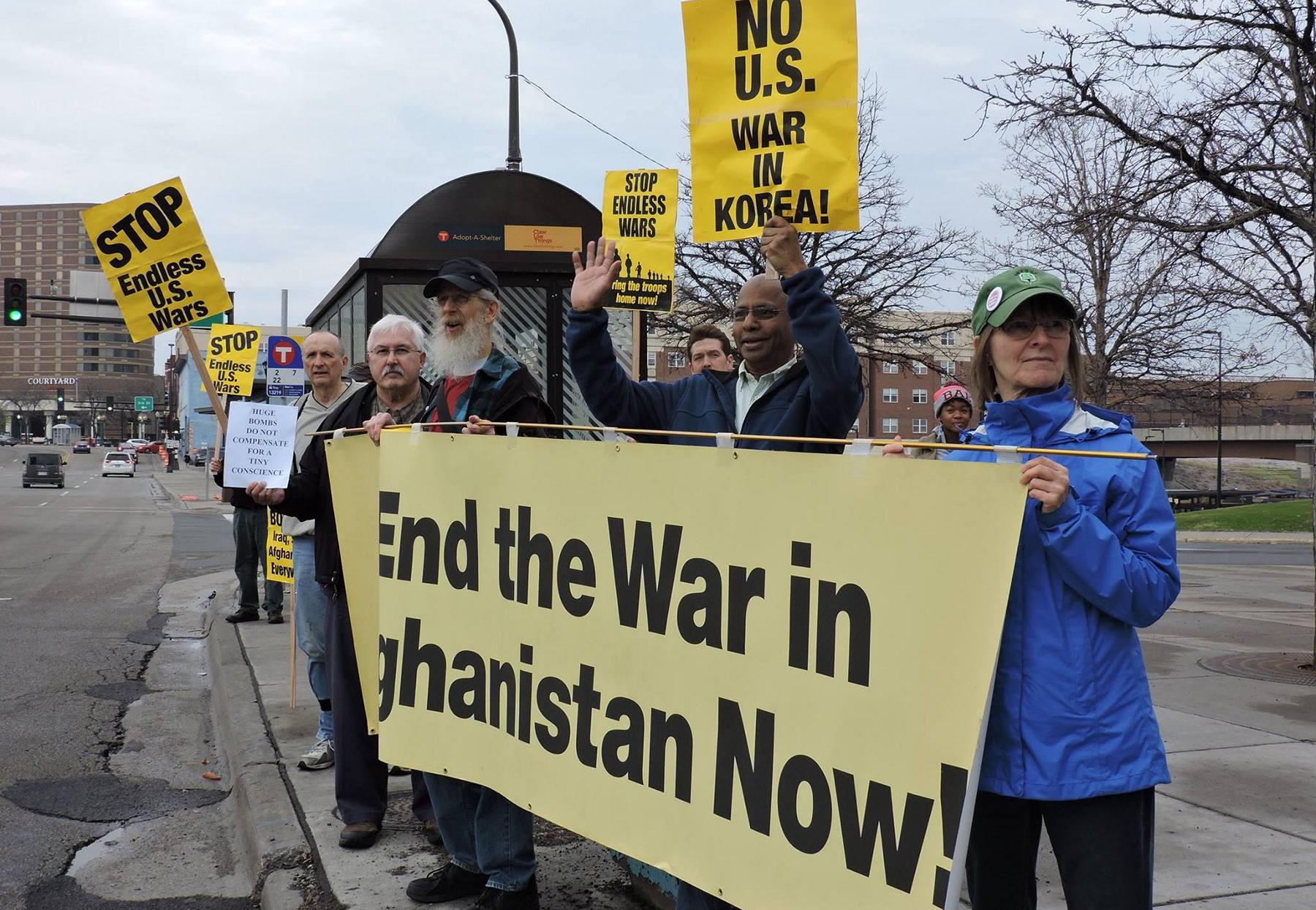
Minneapolis
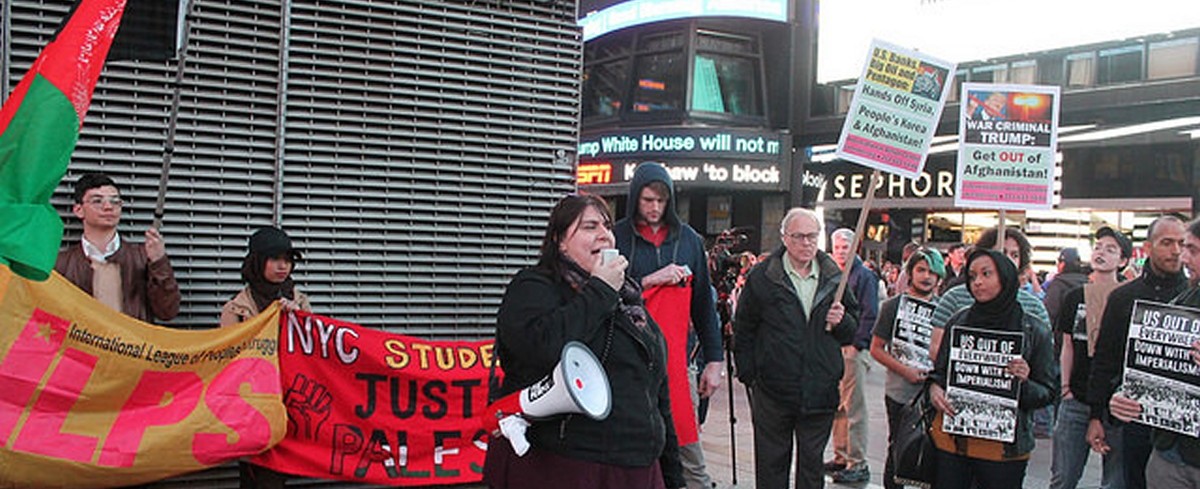
New
York
City

Washington,
DC
Europe
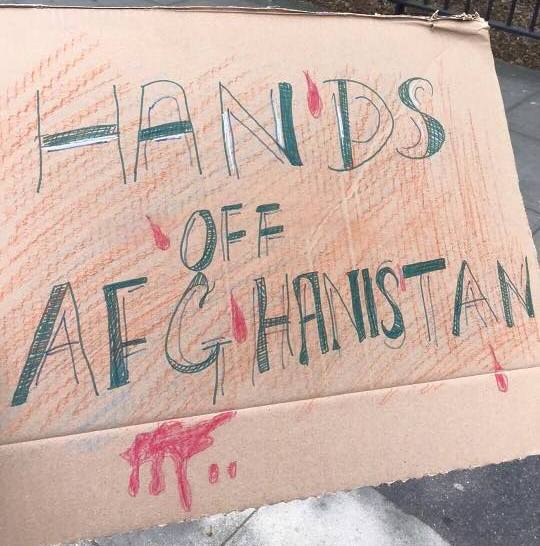
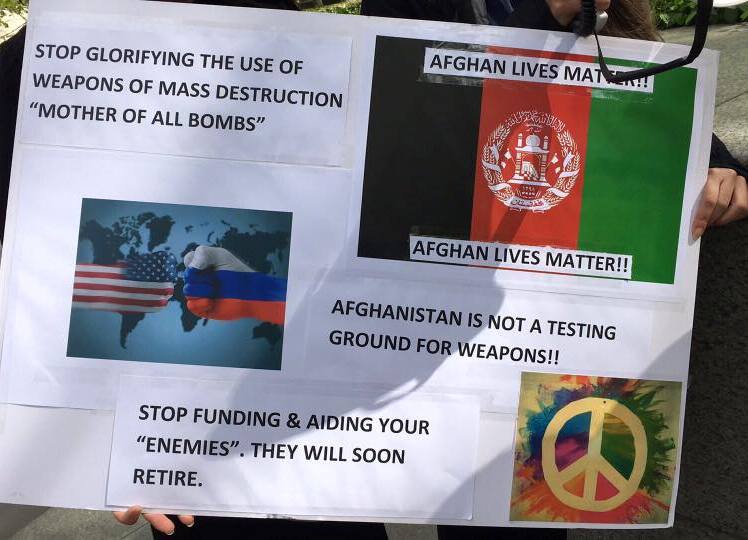
London
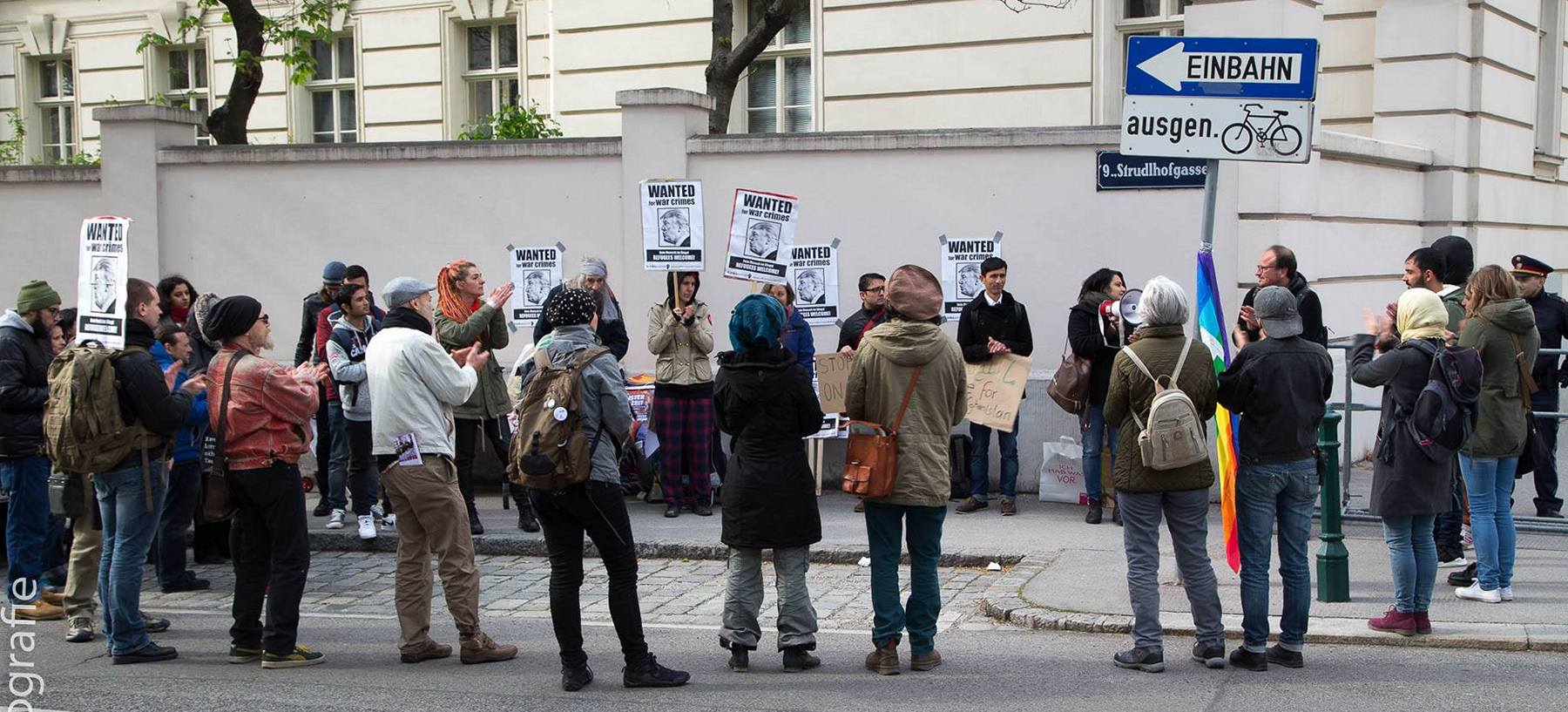
Vienna
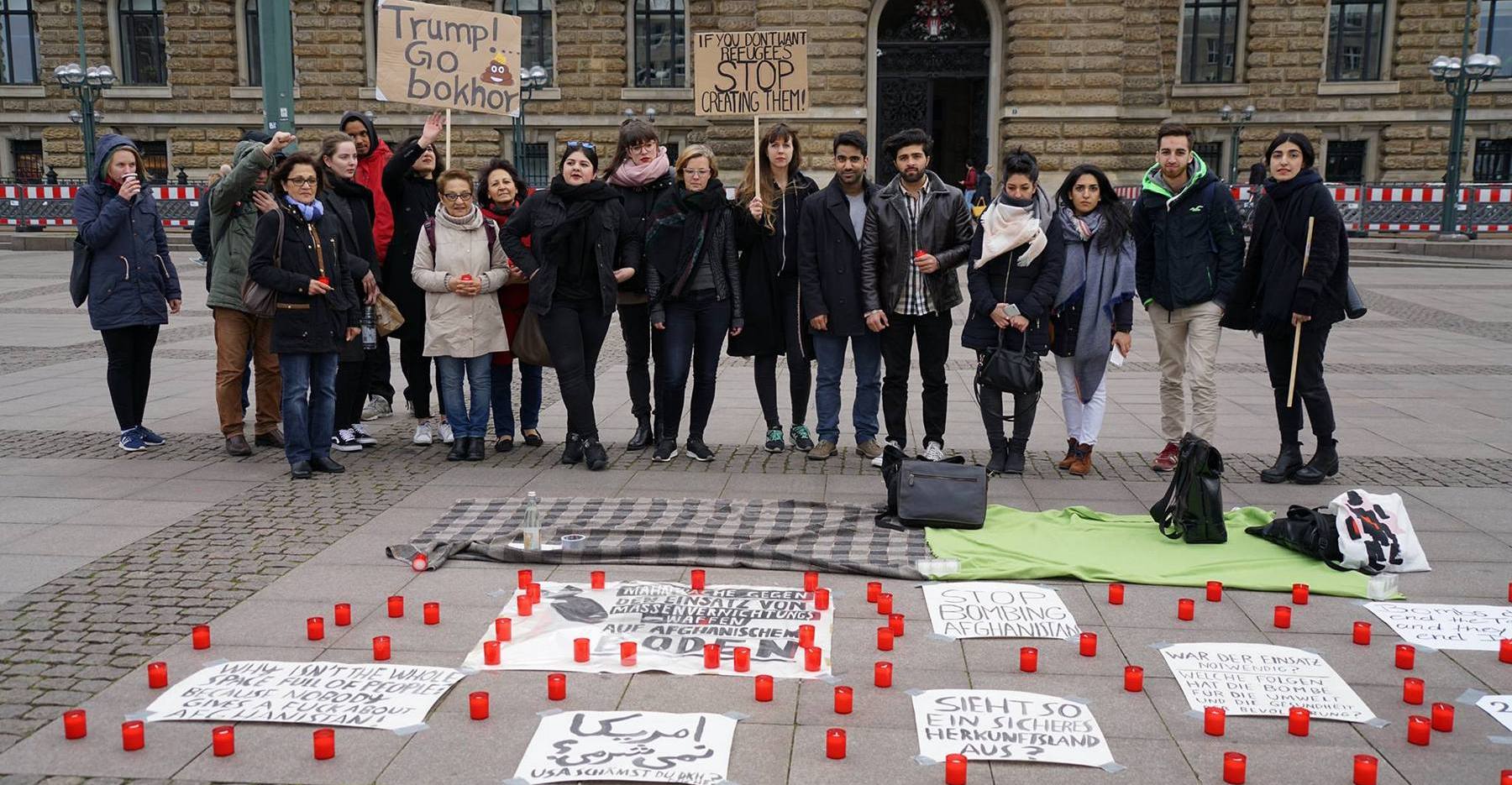 Hamburg
Hamburg
Note
1. The MOAB is a weapon of mass destruction, the largest non-nuclear bomb in the U.S. arsenal. Its use came one week after U.S. airstrikes on Syria, on the spurious pretext that the Syrian government used weapons of mass destruction, i.e., chemical weapons.
This first use of the MOAB in the field killed at least 94 people. The U.S. military says it dropped leaflets in the area asking civilians to leave in the weeks leading up to the bombing where it was already carrying out heavy fighting. This feeble act of "due diligence," coupled with regular killings of civilians by NATO forces -- victims who are infamously dismissed as collateral damage -- surely indicates that the U.S. military's claims that no civilians were killed is just so much hogwash. Since the bomb was dropped, no civilian reporters or even Afghan military forces have been permitted into the area to assess the damage or the veracity of the U.S. military's claims.
(With files from Afghans United for Peace, Afghan Student Network, Fight Back News, Press TV, hambastagi.org. Photos: hambastagi.org, TML, Minnesota Peace Action Coalition, Fight Back News, D. Raja, G. Cohen, M. Samiullah, tryfotographie, E. Cucina)
Venezuela's Resistance to Imperialist Interference
Oppose Canada's Nefarious Role!
Hands Off Venezuela!
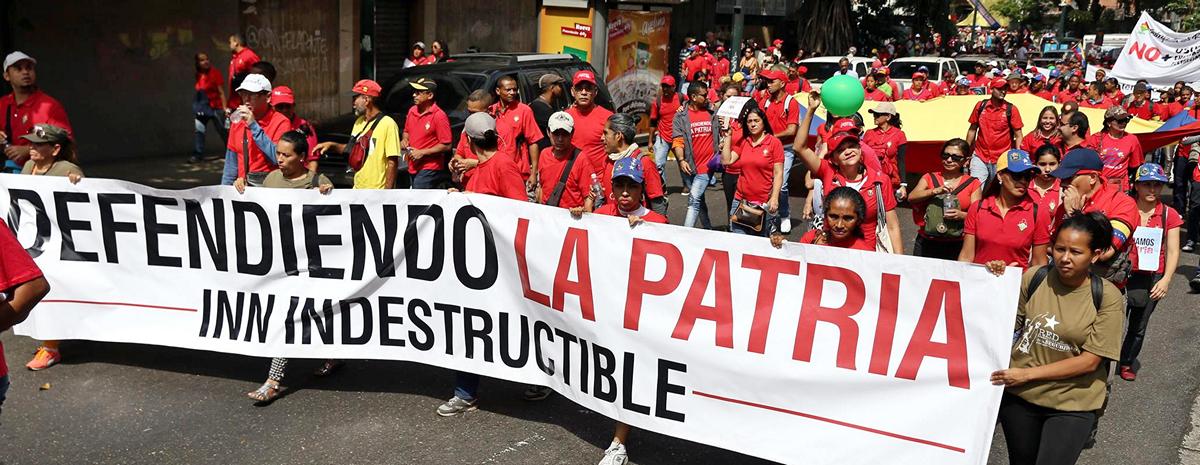
Caracas, Venezuela mass actions defend Bolivarian Republic on
Independence Day,
April 19, 2017.
Canada is engaging in more nefarious activities against Venezuela as forces inside the country work to promote foreign intervention and a coup against the government of Nicolás Maduro and the Bolivarian Revolution. This includes through the Organization of American States (OAS), the Washington, DC-based agency founded and historically used by the U.S. to facilitate its domination of the countries of Latin America and the Caribbean.
Canada Leads "Institutional Coup" at the OAS
A special meeting of the OAS Permanent Council was convoked April 3 by 20 of its 34 member countries "to consider the recent events in Venezuela" and entertain a draft resolution said to be supported by the same 20 countries.[1] Past attempts to pass resolutions against Venezuela at the OAS failed miserably. This was no exception, notwithstanding a declaration that the resolution was "adopted" by a minority of the delegates while most abstained.
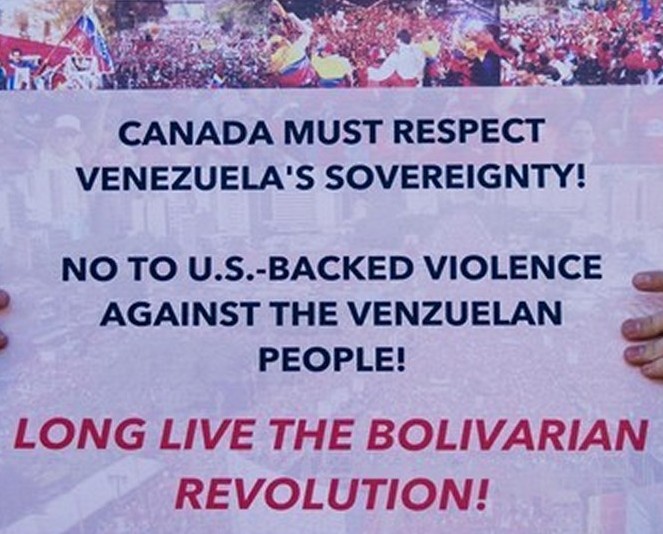
The meeting was called in violation of the OAS rules of procedure since Bolivia's ambassador, Diego Pary, who assumed the Chair of the Permanent Council on April 1, had not been consulted. Showing Canada's dirty role, the official request for the holding of this special meeting was sent on the letterhead of the Permanent Mission of Canada to the OAS, with Canada the first country named on the list of those making the request.
The contents of the resolution submitted by Canada and the others, expressing their "grave concern regarding the unconstitutional alteration of the democratic order in the Bolivarian Republic of Venezuela" and calling for the OAS to "foster the restoration of the democratic institutional system," in accordance with its Inter-American Democratic Charter represent blatant interference in Venezuela's internal affairs. The deceptively-named Democratic Charter, a U.S. invention adopted by the OAS at a special session on September 11, 2001, is nothing more than a tool for violating the sovereignty and interfering in the internal affairs of member states who like Venezuela assert their independence and refuse to come under imperialist dictate.
The Bolivian Ambassador suspended the meeting for the lack of prior consultation or any information about the agenda being provided to him as Chair. In a statement denouncing the convoking of the meeting, Bolivia's Ministry of External Relations explained why it had been suspended and said it would be convened once the appropriate arrangements had been made in accordance with the Charter of the OAS and the rules of the Organization. The statement went on to say that while Bolivia was willing to work on the basis of mutual respect and collaboration with all countries of the hemisphere and the world, it rejected any attempt to undermine its dignity and that of its representatives and said it would never accept "any impositions or pressure on its sovereignty as a country."
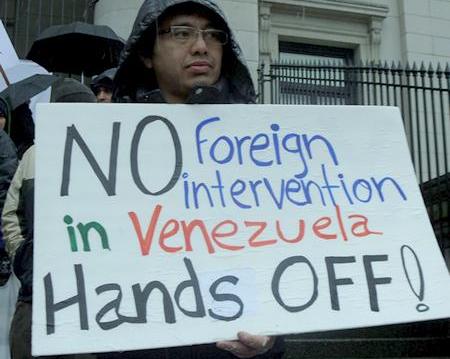 To "adopt" a resolution
after the meeting had been suspended,
Canada and others carried out what was described as an
institutional coup within the OAS Permanent Council against its
Chair and Vice Chair and the organization's own rules and
procedures. Invoking an OAS bylaw that provides for the
representative of a member state with the most seniority on the
Permanent Council to assume the Chair on an interim basis "in the
temporary absence" of the Chair and Vice Chair, the Honduran
representative, Leonidas Rosa Bautista proceeded to oversee the
illegal "meeting."
To "adopt" a resolution
after the meeting had been suspended,
Canada and others carried out what was described as an
institutional coup within the OAS Permanent Council against its
Chair and Vice Chair and the organization's own rules and
procedures. Invoking an OAS bylaw that provides for the
representative of a member state with the most seniority on the
Permanent Council to assume the Chair on an interim basis "in the
temporary absence" of the Chair and Vice Chair, the Honduran
representative, Leonidas Rosa Bautista proceeded to oversee the
illegal "meeting."
Before the resolution could be voted on, the representatives of Bolivia, Venezuela and Nicaragua entered the meeting hall and raised points of order, denouncing the institutional coup. To rescue the situation, Canada's Ambassador Jennifer Loten rose to declare the meeting to be perfectly legal and correct and asked the "Chair" to get on with debating the resolution Canada had submitted on its letterhead.
|
|
Mexico called for adopting the motion then and there "without a vote" while Canada proposed delaying the vote for two days, saying this would allow time to find more support (i.e., to bribe, pressure and coerce more countries) and possibly amend the resolution "to better reflect the will of the majority." Regardless, Canada's representative stated that the Canadian government "very firmly supported" the resolution as it reflected its "grave concerns" over the "decline in democracy" in Venezuela and "that is what the Inter-American Democratic Charter is for."
Despite the suspension of the meeting by the legitimate Chair, and with four countries still present declaring their intention to abstain, others having walked out in protest after intervening on points of order, and many more having stayed away completely, the coup "Chair" declared the resolution adopted by consensus "with no objections"! One of those who made a point of speaking in support of what had just transpired was the U.S. representative who asserted that "everyone" was affected by the situation in Venezuela and this made it important for the OAS to "be involved." He declared ominously that the resolution with its call for dialogue and a peaceful resolution in Venezuela was a good preventive measure to take, at least until it no longer appeared to be useful. He then issued a number of threats and even warned Venezuela to "respect the sovereignty and territorial integrity of its neighbours."
Unacceptable Interference by Parliamentary Subcommittee
On April 6, the Subcommittee on International Human Rights of Canada's House of Commons Standing Committee on Foreign Affairs and International Development held an "emergency briefing" on the "Human Rights Situation in Venezuela." The committee, which has held numerous similar meetings in the past, provided an official venue for the promotion of the most egregious lies from those in Canada and outside of it who have been calling for external intervention to carry out regime change in Venezuela for years.[2] No opportunity was provided for the official representatives of the Venezuelan government in Canada, nor were any representatives of Venezuelan political parties or social organizations which do not share the aim of removing the elected government or calling for foreign intervention invited to participate, give their views or respond.
The main content of remarks made by the two invited witnesses, both of whom live in Canada, consisted of half-truths, slanderous accusations and outright lies for the purpose of "proving" that the people of Venezuela are in dire straits, living through a humanitarian crisis and suffering widespread human rights abuses on a scale warranting urgent intervention against the country's government by "the international community." The aim was also to hide the many achievements of the Bolivarian revolution in terms of human rights and in many other areas over the past 18 years based on its rejection of neoliberal "solutions." After hearing testimony and engaging in a Question and Answer session with the witnesses, the Subcommittee passed a motion which blatantly interferes in Venezuela's internal affairs and tries to justify Canada's actions at the OAS just days prior. The motion was subsequently issued as a press release by the Committee entitled Human Rights Situation in Venezuela and the Response of the Organization of American States.[3]
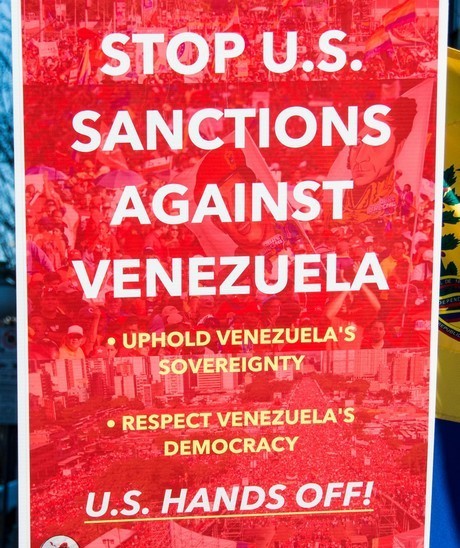
The essence of the Parliamentary meeting on the "Human
Rights
Situation in Venezuela" was to not permit any discussion of what
is taking place in Venezuela and why, how the lives of
Venezuela's working people have changed for the better thanks to
the Bolivarian revolution led by Hugo Chávez until his untimely
death four years ago and by President Nicolás Maduro today, and
how the pro-social nation-building project in Venezuela has come
under relentless attack by the U.S. imperialists and oligarchy
who are being deprived of power. The well-documented economic sabotage
which has contributed greatly to current hardships facing Venezuelans
was also not allowed to be examined.
Despite Venezuela's current economic difficulties, the Subcommittee was not told, for example, that on February 25, Venezuela's Great Housing Mission reached a landmark of 1.5 million new public dwellings that have been built since the start of the project in 2011, and that by the end of 2017 another 540,000 new homes will be handed over to Venezuelans. In 2016, mass mobilizations blocked attempts by the political forces that Canada is supporting in Venezuela to privatize these housing units and hand them over to landlords and speculators.
Poverty in Venezuela in 1999 stood at 44 per cent of the population while 20 per cent of the people lived in extreme poverty. Today, poverty and extreme poverty have been reduced to 27 per cent and 5.4 per cent, respectively. In 1998, 21 per cent of the population suffered from undernourishment, and today this figure is two per cent. The number of underweight children in 1998 was 5.3 per cent, a figure cut in half by 2012. Today 95.4 per cent of Venezuelans eat three times per day, according to the National Institute of Statistics. Access to drinking water has gone from 80 per cent of the population in 1998 to 96 per cent today. Social investment has gone from 37 per cent of the state budget in the years before Chávez took office to 61 per cent today.
Illiteracy has been eradicated, following the example of Cuba, and Venezuela now has one of the world's highest proportions of citizens attending university. More than 80 per cent of Venezuelans have accessed the country's public health care system, and more than 10,000 health centres have been constructed during the revolution. Infant mortality has dropped by one-third, resulting in hundreds of thousands of lives saved. In 1998, unemployment stood at 14.5 per cent officially. This number has been reduced by two-thirds, and formal employment has risen to 60 per cent of the population. More than 2.5 million people are now receiving a state pension, versus 387,000 before the Bolivarian revolution.
When the aims are foreign intervention and regime
change these important victories for the people's well-being have to be
covered up. Canada is following the lead of the U.S. to raise hysteria
about alleged Russian interference in political institutions while
openly interfering in Venezuela's democratic institutions, against the
sovereign will of its people. It must be condemned.
Notes
1. The delegations which requested the April 3 special meeting of the OAS Permanent Council were those of Argentina, the Bahamas, Barbados, Belize, Brazil, Canada, Chile, Colombia, Costa Rica, Guatemala, Guyana, Honduras, Jamaica, Mexico, Panama, Paraguay, Peru, Saint Lucia, the United States and Uruguay. The Permanent Council is comprised of one representative of each member state who is designated as the country's ambassador. The offices of the chair and vice-chair are held by each country's ambassador on a rotating basis, with the terms running for three months.
2. The Parliamentary Subcommittee meeting was addressed by:
- Maria Margarita Torres, a West Montreal municipal councillor who was born in Venezuela but has lived in Canada for 40 years, since age 20. In her testimony she said she visits family in Venezuela every year and claimed that through these visits she has "witness[ed] the rapid deterioration of the country and its people," saying she was "shocked" by "the atrocities and violations committed against Venezuelan people at the hands of the government."
Torres claimed that the Venezuelan government was torturing "political prisoners," told of people being forced to stand in line for hours to buy basic foodstuffs and scavenging for food in piles of garbage and claimed levels of malnutrition and neo-natal mortality were "at an all-time high." She and her co-presenter submitted as "evidence" for their allegations a report by OAS Secretary General Luis Almagro -- no doubt the same slanderous one attacking the Bolivarian government and President Nicolás Maduro and calling for Venezuela to be suspended from the OAS, for which he sought but failed to get approval at a March 28 meeting of the OAS Permanent Council.
Torres concluded her remarks stating, "Our hope is to impress on you the urgent need that exists today to discuss and establish a concrete set of recommendations that will lead to an immediate action plan, one that this government can enact in order to help us fight human rights violations in Venezuela, and in the process, help us restore its democracy."
- Orlando Viera-Blanco, a Canadian resident and lawyer who the opposition-controlled National Assembly of Venezuela has named as an "external adviser" to its Committee on Foreign Affairs and Sovereignty. He is President of a group called the Canadian Venezuelan Engagement Foundation which claims to be "Venezuelans in exile" committed to defending the human rights of Venezuelans still living in the country via engagement with the Government of Canada.
Viera-Blanco tried to make the case for what he called "an on-going coup d'etat" in Venezuela, asserting that "everyone is now describing the situation as a rupture, or breakdown, of the constitutional order and a coup d'état." He also claimed that "changes to Venezuela's constitutional order" had led to the suffering of the Venezuelan people "for the past 18 years" -- in other words, since the election of Hugo Chávez to the Presidency of Venezuela that brought undisputably massive improvements to the Venezuelan people's social and living conditions.
The full testimony and Q and A from the meeting can be found here.
3. Endorsing the nefarious activities of those who had
just organized an unconstitional coup at the OAS in the name of
rescuing democracy in Venezuela, the Subcommittee affirmed its support
for "the work of members of the Organization of American States (OAS)
Permanent Council to develop concrete measures to guide Venezuela to a
return to constitutional order" and applauded in particular the efforts
of OAS Secretary General Luis Almagro to "hold the Venezuelan executive
branch to account."
Their motion ended with a call for the Government of Canada and
"international community" to intervene in Venezuela on spurious grounds:
"The Subcommittee stresses the need for the Government of Canada and
the international community to develop effective measures to promote
the restoration of Venezuela's constitutional order, to address the
ongoing humanitarian crisis, and to allow Venezuelans to enjoy their
basic human rights. We urge the international community to ensure that
the Venezuelan regime is held accountable for abuses of internationally
recognized human rights."
The Chair, Liberal MP Michael Levitt (York Centre) said of the motion, "It is time to take real, concrete action to ensure that constitutional and democratic order -- including respect for the separation of powers and fundamental freedoms -- is restored in Venezuela. Venezuelans have suffered long enough."
One Vice-Chair, Conservative MP David Sweet (Flamborough-Glanbrook) stated, "The use of state machinery to suppress dissent cannot be tolerated. The detention of political prisoners is but one of the Venezuelan regime's many cynical ploys to cling on to power, even at the expense of 30 million Venezuelans and the Venezuelan constitution."
The other Vice-Chair, NDP MP Cheryl Hardcastle (Windsor-Tecumseh), who did not attend the April 6 Standing Committee meeting and was replaced by MP Erin Weir (Regina-Lewvan) said, "It is crucial at this juncture that the international community stress the responsibility of governments to protect and strengthen democracy. Respect for human rights is fundamental and we urge the government and oppositional parliamentarians to show their dedication to the well-being of their people. We support them in this endeavour."
Venezuelans Mobilize in Defence of
Bolivarian Revolution
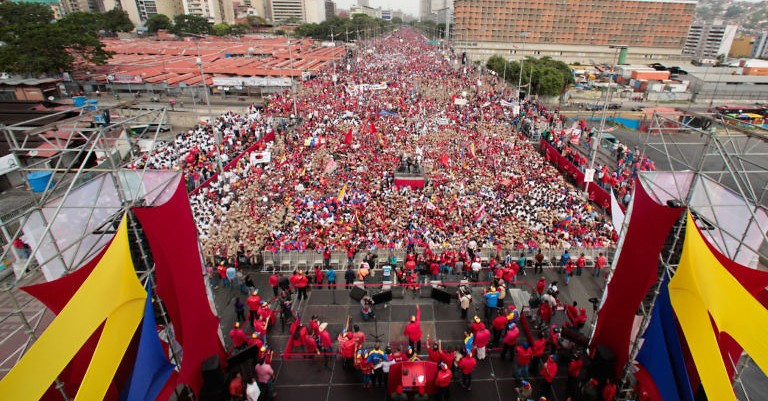
President Maduro addresses rally, Caracas, Venezuela, April 19, 2017.
More than a million Venezuelans marched in the capital, Caracas and throughout the country on April 19 in defence of the country's sovereignty and Bolivarian revolution against foreign intervention, violence and destabilization. April 19 marked the 207th anniversary of the beginning of Venezuela's war of independence against Spanish colonial rule.
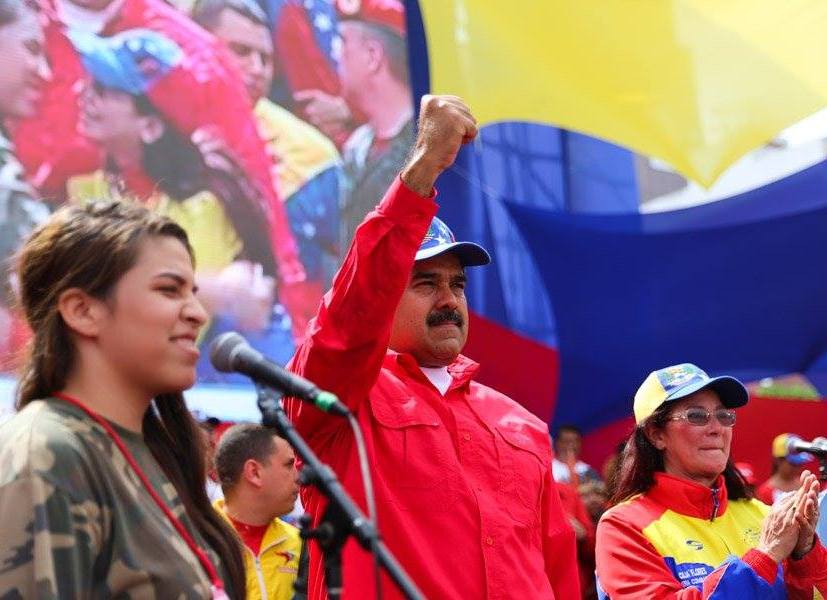
Demonstrators chanted, "They will not return!" in reference to the former domination of Venezuela by the imperialists and the rich. Reports said the mobilization was the largest in recent years, a rejection of efforts by the U.S. imperialists, the Organization of American States, Canada and the regional oligarchy to instigate chaos and overthrow the government of Nicolás Maduro.
Speaking in Caracas, President Maduro called on Venezuelans to prepare for a complete, peaceful and democratic victory over coup attempts. He said the mass mobilization marked a triumph over attempts by foreign-sponsored groups to incite violence in the anti-government actions also planned for that day.
President Maduro said that there are three reasons that U.S.-aligned forces have stepped up their violence and calls for foreign intervention: fresh support from the new Trump administration in the U.S.; improvements in the economic situation inside the country; and the failure of the opposition-controlled National Assembly to address any of the problems facing Venezuelans. Maduro also took the opportunity to state his support for holding regional elections throughout the country when a date is determined by the National Electoral Council.
Mobilization Overcomes Provocations
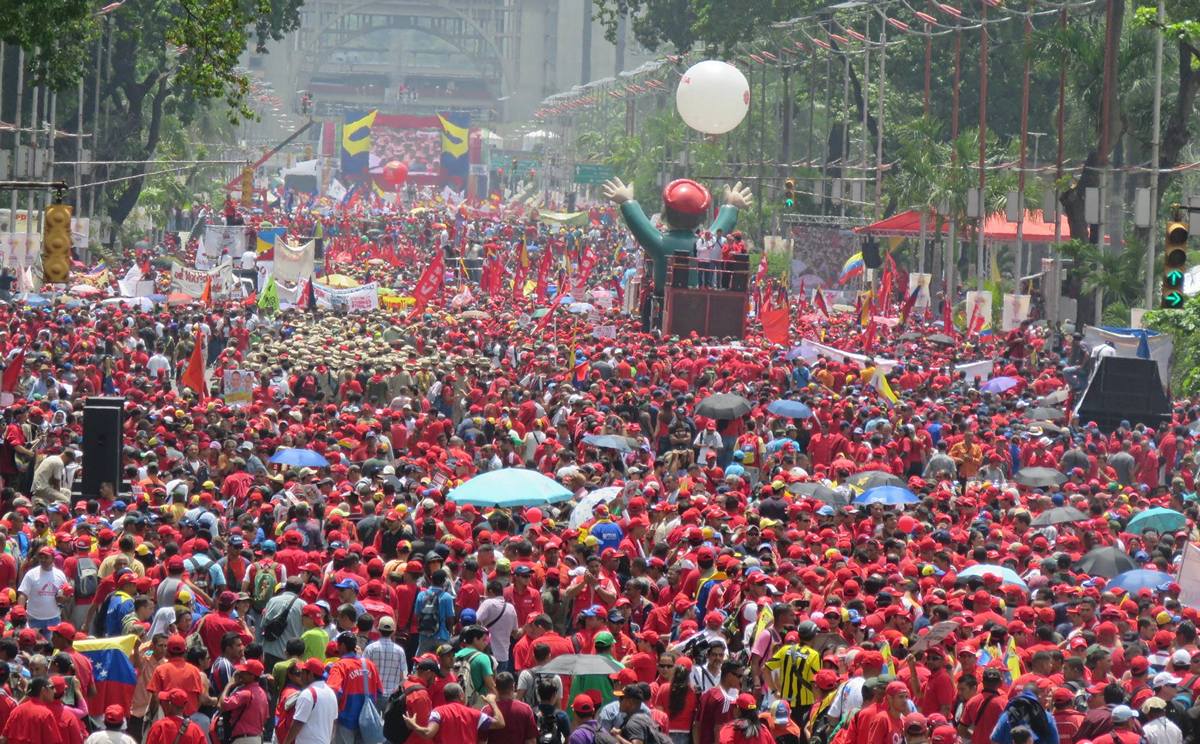
Two deaths in the context of the anti-government protests taking place at the same time bore the hallmarks of an organized provocation to incite further violence and destabilize the country, something seen in the previous U.S.-backed coup in Venezuela in 2002 as well as more recently in the "Maidan" coup d'etat in Ukraine in 2013.
Nineteen-year-old Carlos Moreno was not a protestor but was shot and killed on April 19 in the vicinity of a demonstration and rumours were quickly spread throughout opposition protests that he had been killed by armed government supporters. The killing of Paola Andreina Ramirez, a 23-year-old woman who likewise was not participating in protests, was immediately blamed on "Chavistas" in Venezuela's privately-owned media.
Venezuela's Ombudsman Tarek William Saab called for a full investigation into the deaths and punishment for the guilty. He also announced that a suspect in the killing of Ramirez had been arrested. Saab also announced that a member of Venezuela's Bolivarian National Guard, Niumar José Barrios, who was killed the same day, had been shot by a sniper, along with another National Guard member who survived.
These tragic events were used to fuel further organized counter-revolutionary violence at anti-government demonstrations, including attacks on police and public buildings with molotov cocktails, slings and other weapons, as well as throwing glass jars and bottles at pro-government demonstrators which led to the hospitalization of one woman. In the days leading up to April 19, public buildings were vandalized including a high school, a community health centre, subsidized food markets and government ministries.
A Factor for Peace
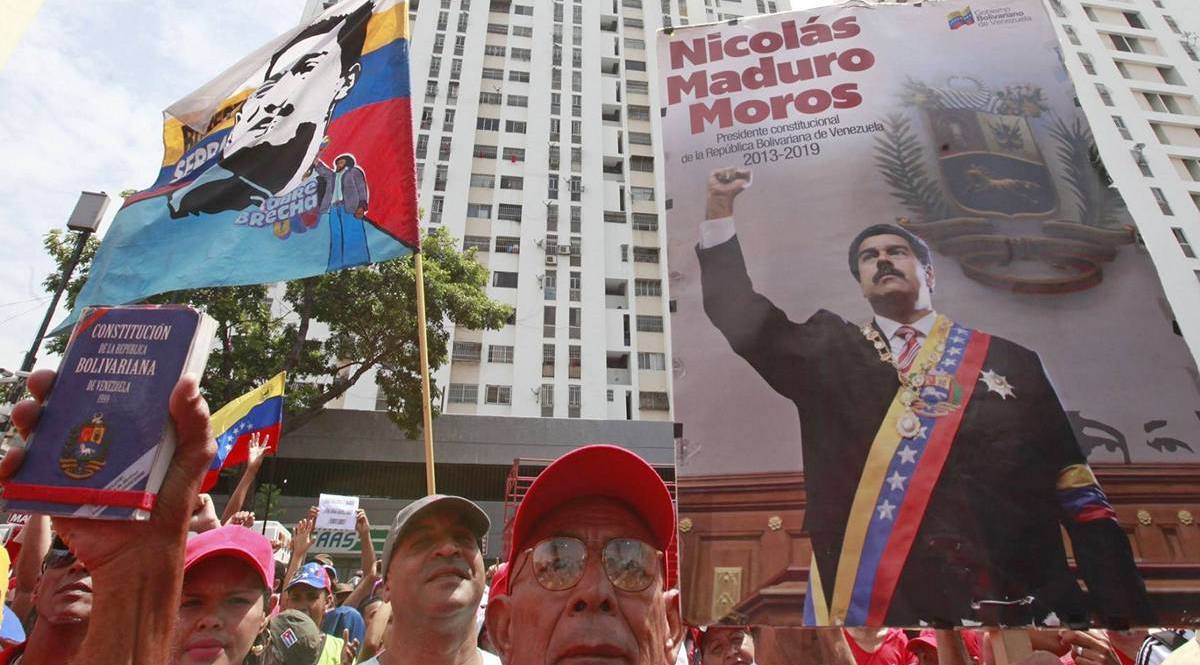
President Maduro called the mobilization of Venezuelans in support of the Bolivarian Revolution a point in favour of peace in the country. "When the Bolivarian people are in the street, there is peace," he said. "Today they tried to take power again and we have again defeated the coup plotters, the corrupt right-wing and the interventionists."
A joint statement in advance of the April 19 Bolivarian marches was issued by U.S.-backed governments in Latin America -- many of which are notorious for violent repression of protests such as Honduras, Mexico, Argentina and Colombia -- calling on the Venezuelan government to "ensure the right to peaceful protest" and "avoid violence." A subsequent statement by the U.S. State Department supported the call and referred to "the undermining of democratic institutions and practices," while Organization of American States Secretary General Luis Almagro issued his own statement calling Venezuela a "repressive regime."
Venezuelan Foreign Minister Delcy Rodriguez pointed out
the
hypocrisy of these governments criticizing human rights in
Venezuela. She affirmed that Venezuela, unlike these governments,
can show the whole world a participatory democracy that affirms
human rights. Rodriguez noted that the foreign intervention in
Venezuela is not simply to remove its president, but to undermine
and reverse its nation-building project and example to the
peoples of Latin America and the Caribbean.
TML Weekly
salutes the efforts of the Venezuelan working class and people who,
facing immense pressure from the imperialists and their lackeys, are
going all out to defend their Bolivarian Revolution and nation-building
project. TML Weekly calls on
Canadians to be active in denouncing any attempts by Canada to violate
Venezuela's sovereignty and to oppose disinformation to justify
imperialist intervention.
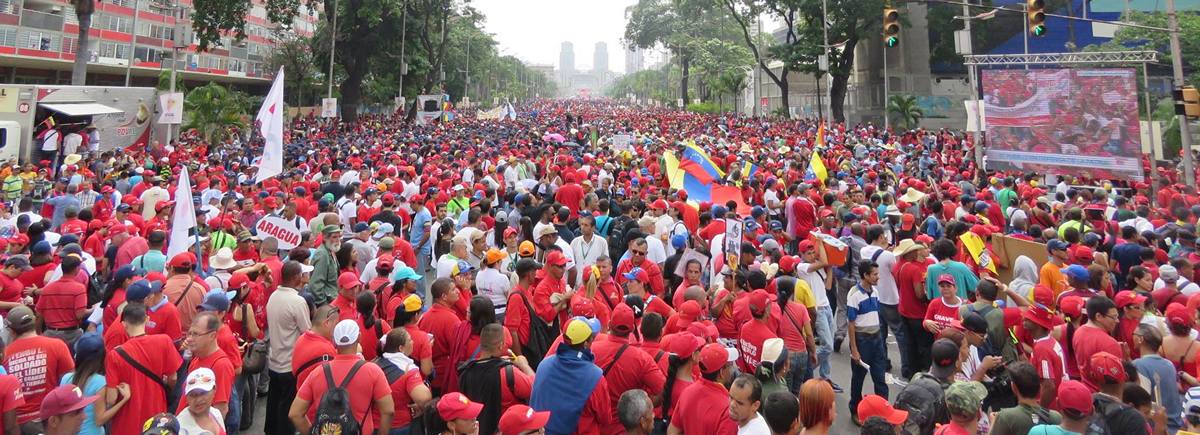
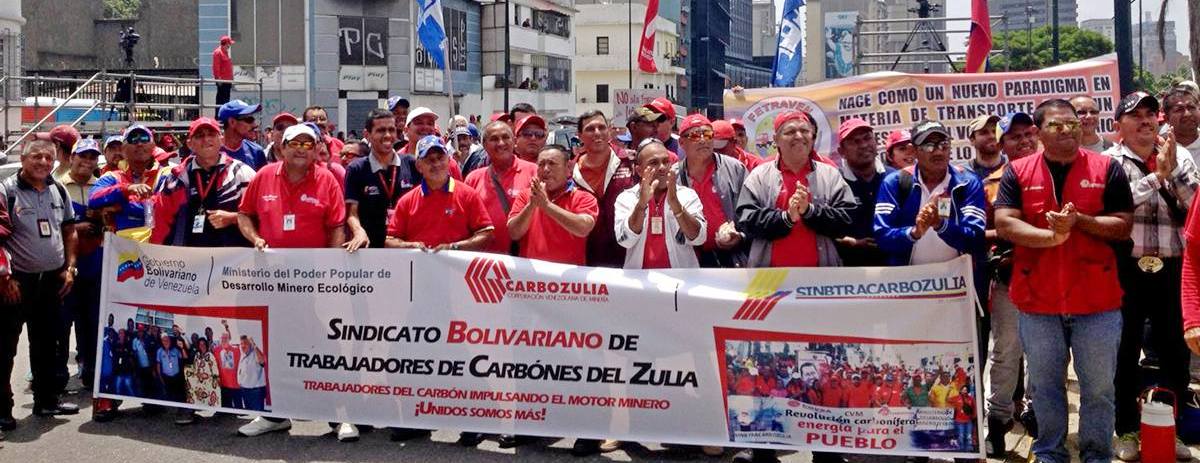
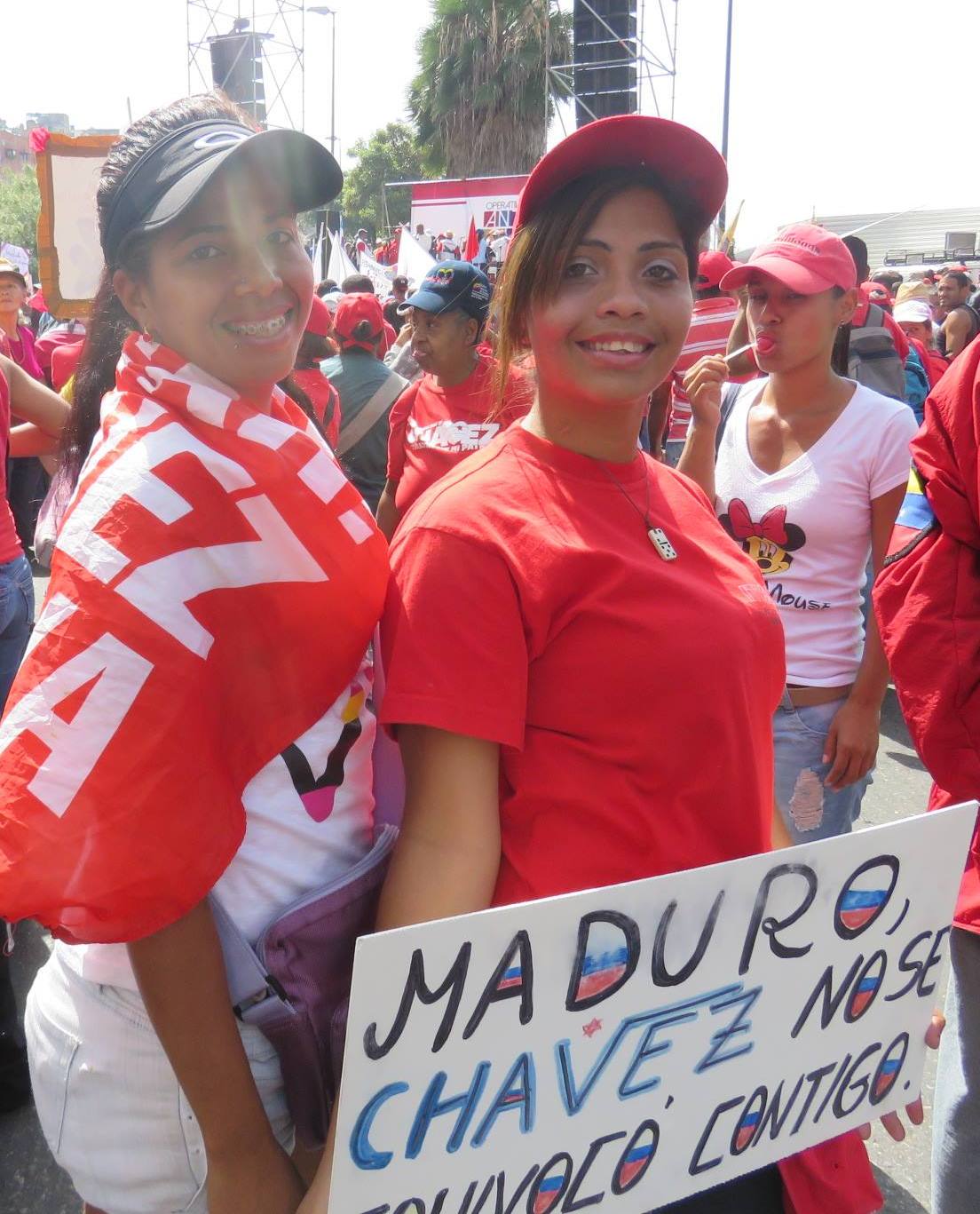
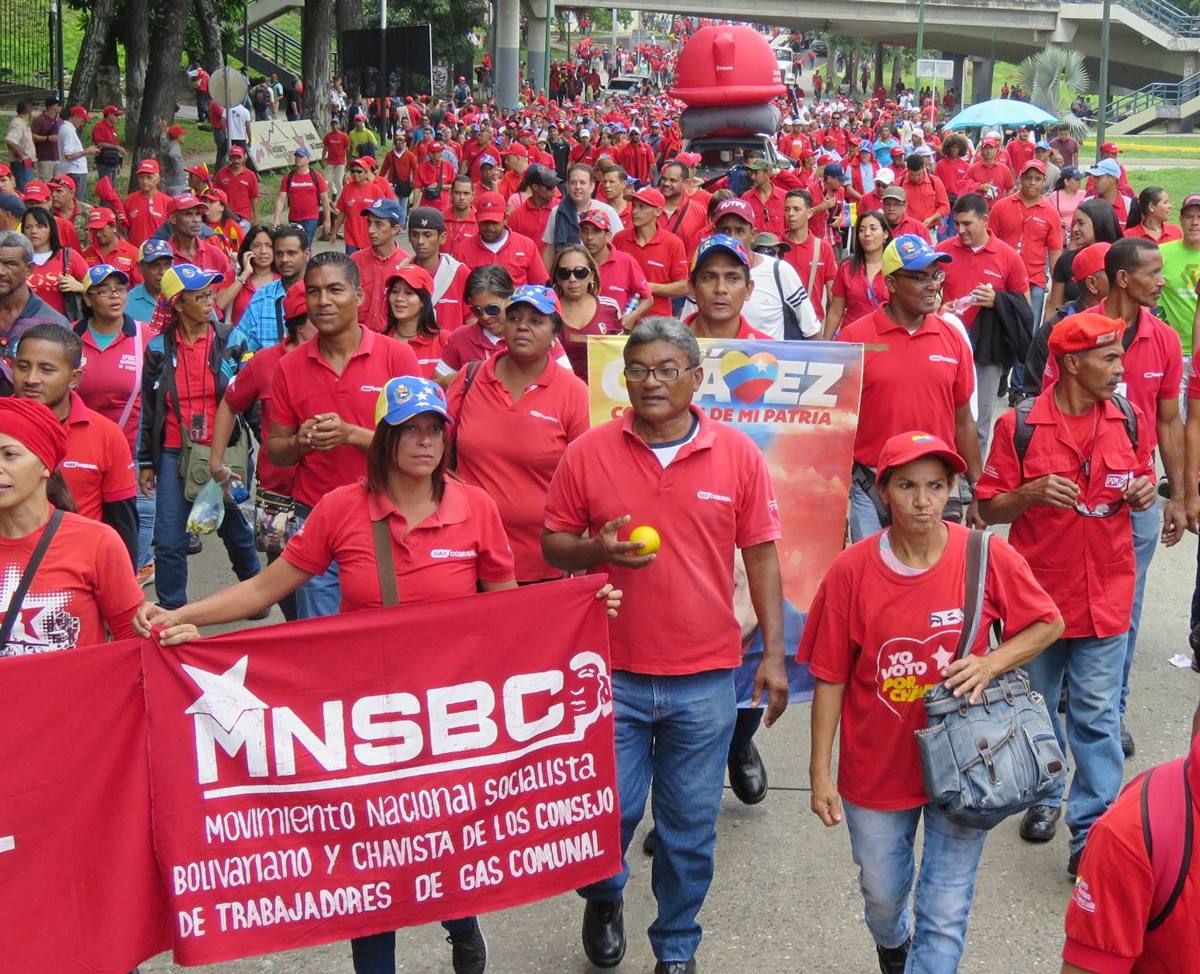
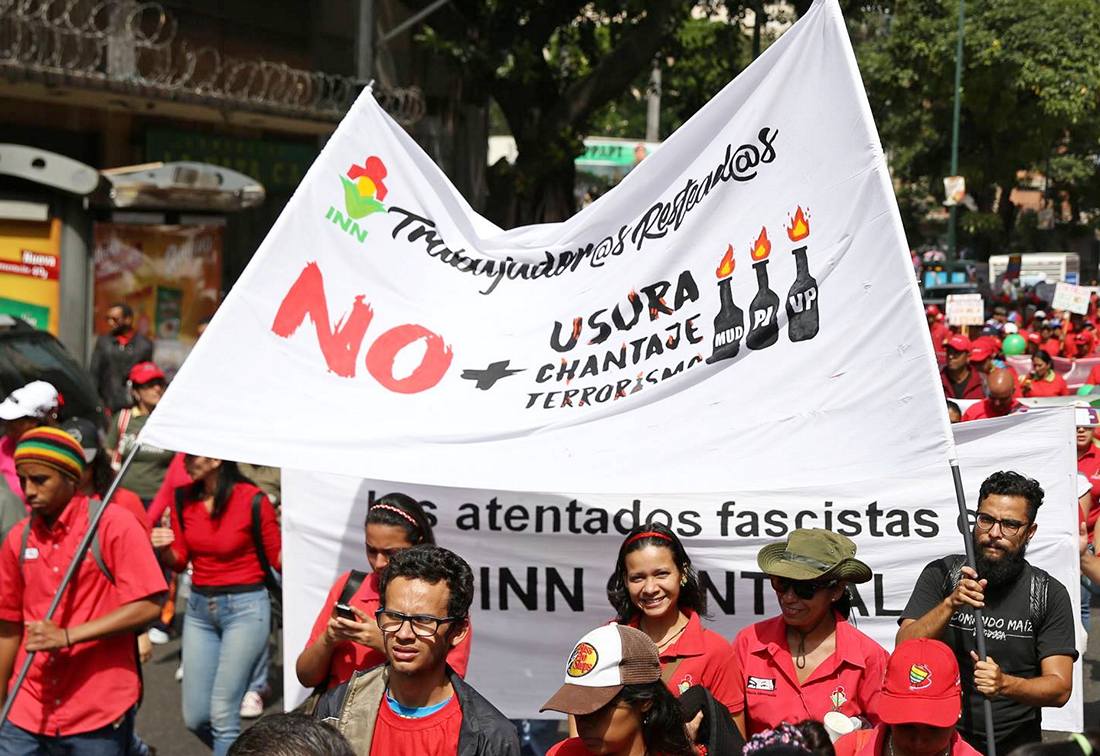
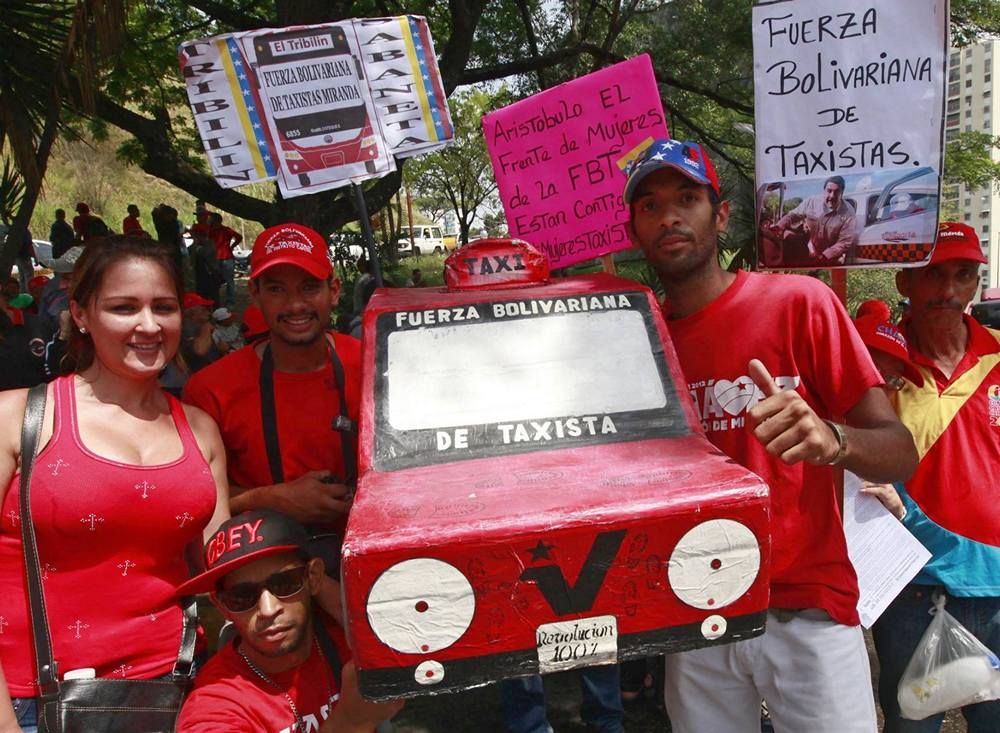
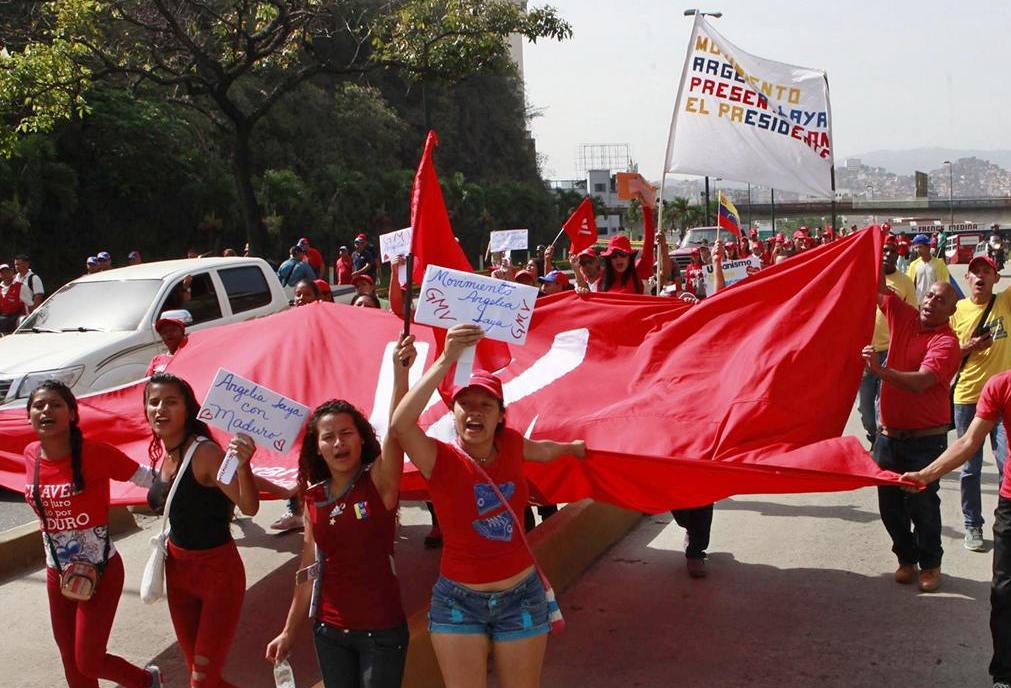
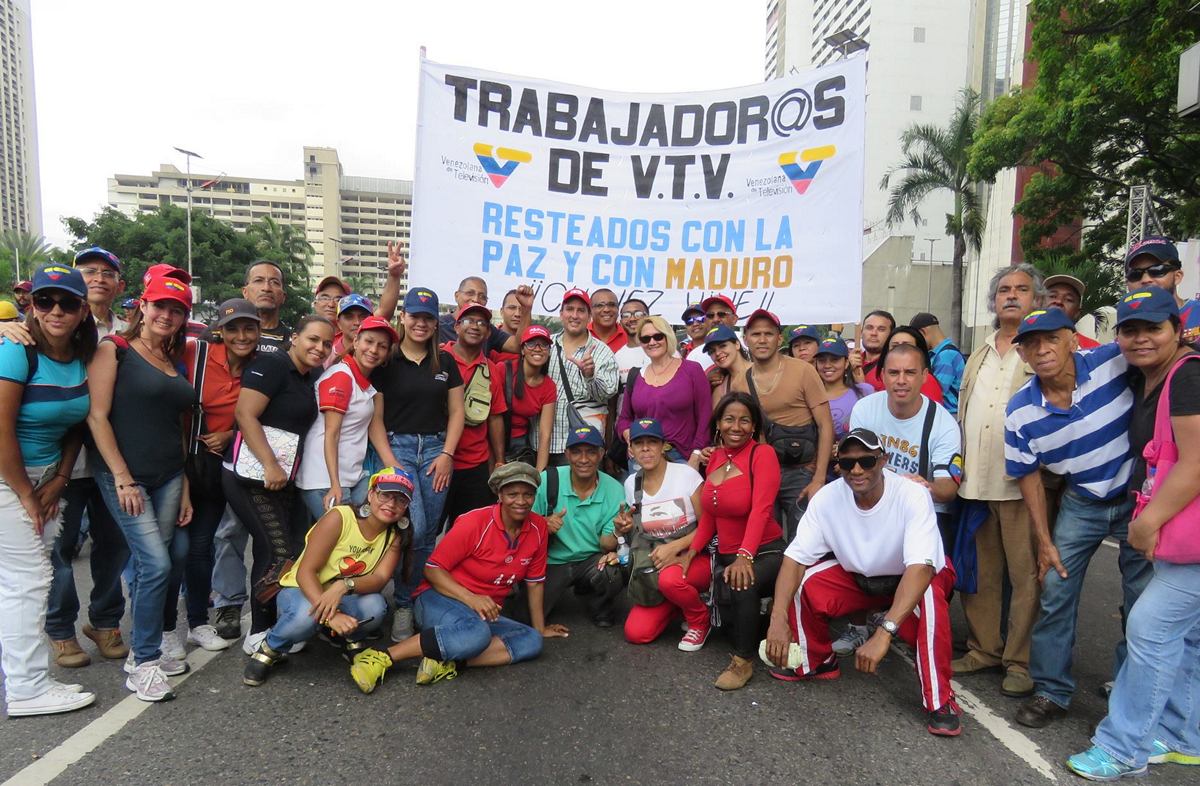
(With files from AVN, TeleSUR. Photos AVN, VTV.)
Mass Hunger Strike Launched on Palestine Prisoners' Day, April 17
Freedom for Palestine and All Political Prisoners
in Israeli Jails! Resistance Is a Right!
End the Occupation!
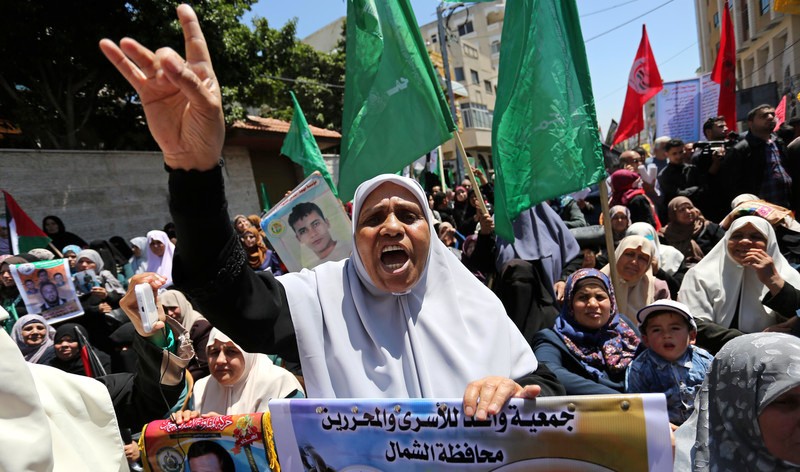
Palestine Prisoners' Day action in support of prisoners' mass hunger
strike,
Gaza City, April 17, 2017.
As many as 1,700 Palestinian political prisoners are now on a mass hunger strike that began on April 17, Palestinian Prisoners' Day. At present, a total of 6,440 Palestinians are held in Israeli jails, including many children and youth, detained for even the smallest acts of defiance against the occupation. Addameer, the Prisoner Support & Human Rights Association, informs that more than 800,000 Palestinians have been imprisoned or detained by Israel over the past 50 years.
In an April 17 press release, Addameer reports on the hunger strikers' demands and calls for international support:
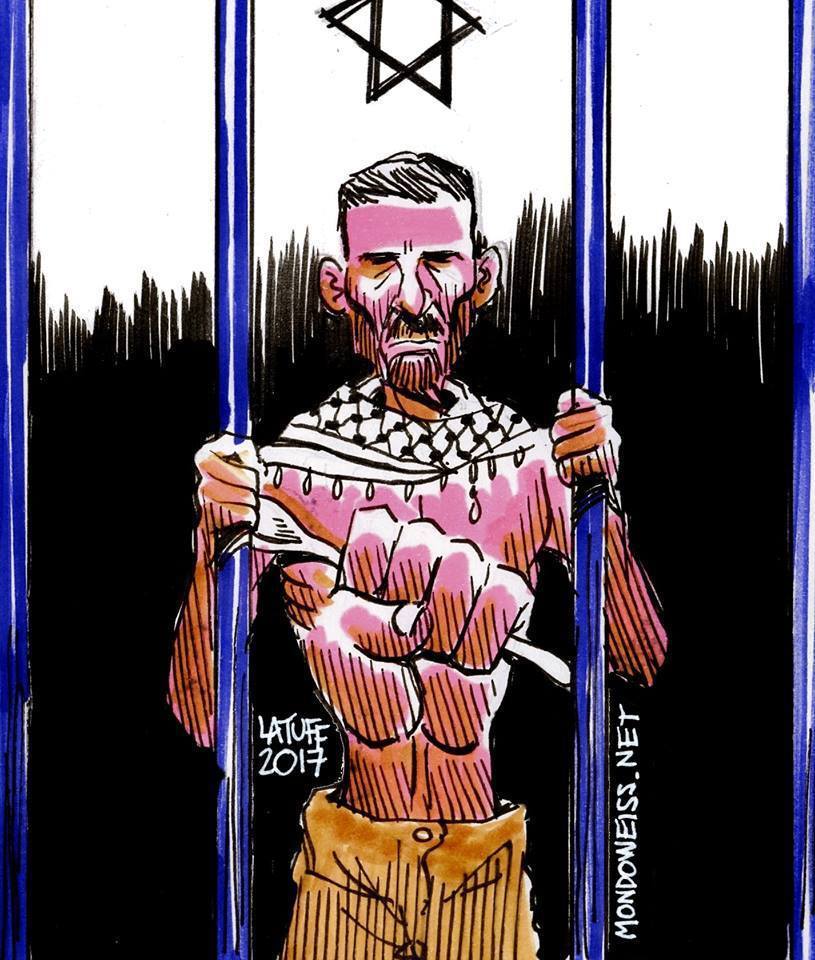 "The hunger striking
prisoners' demands include: family
visits, proper medical care, end to Israel's practice of
detaining Palestinians without charge or trial in so-called
administrative detention and stopping the use of isolation. As
the strike begins, Addameer Prisoner Support urges supporters of
justice around the world to take action to support the
Palestinian prisoners whose bodies and lives are on the line for
freedom and dignity.
"The hunger striking
prisoners' demands include: family
visits, proper medical care, end to Israel's practice of
detaining Palestinians without charge or trial in so-called
administrative detention and stopping the use of isolation. As
the strike begins, Addameer Prisoner Support urges supporters of
justice around the world to take action to support the
Palestinian prisoners whose bodies and lives are on the line for
freedom and dignity.
"The issue of Palestinian prisoners and detainees held in Israeli prisons and detention centers transcends one of individual human rights; it is also one of collective rights of an entire people -- the Palestinian people, who continue to be deprived of the right to self-determination and sovereignty -- basic fundamentals of international law. All Palestinian political prisoners -- regardless of their alleged political affiliations or charges -- are entitled to fair trial guarantees under international humanitarian law and international human rights laws. Palestinian political prisoners and detainees are systematically subjected to torture and ill-treatment with continued impunity -- highlighting the need for more solidarity actions from people around the globe to call for immediate release of all Palestinian political prisoners, long-denied their basic rights.
"Addameer Prisoner Support & Human Rights Association urges all people to organize events in solidarity with the struggle of hunger-striking prisoners and detainees. 2017 marks 100 years of the Balfour declaration; 70 years of Palestinian Catastrophe (al-Nakba); 50 years of brutal military occupation. This is also the year to hold the Israeli occupation accountable for its actions and to demand the immediate release of all Palestinian political prisoners!"
Maan News Agency reports on the inhuman treatment experienced by Palestinian political prisoners in Israeli jails, particularly those who are already ill:
"Central to the long list of demands put forward by Marwan Barghouthi, the leader of what has come to be known as the Freedom and Dignity strike, are a number of demands related to lack of adequate health care in Israeli prisons, as well as what rights groups have branded a deliberate policy of medical neglect of Palestinian prisoners.
 "Hunger strikers are calling
on the Israeli Prison Service
(IPS) to shut down the Ramla prison clinic for not providing
adequate treatment, to terminate Israel's policy of deliberate
medical negligence, carry out periodic medical examinations,
perform surgeries to a high medical standard, allow specialized
physicians from outside the IPS to treat prisoners, release all
sick detainees -- especially those who have disabilities and
incurable diseases -- and not hold prisoners accountable for
expenses incurred for medical treatment."
"Hunger strikers are calling
on the Israeli Prison Service
(IPS) to shut down the Ramla prison clinic for not providing
adequate treatment, to terminate Israel's policy of deliberate
medical negligence, carry out periodic medical examinations,
perform surgeries to a high medical standard, allow specialized
physicians from outside the IPS to treat prisoners, release all
sick detainees -- especially those who have disabilities and
incurable diseases -- and not hold prisoners accountable for
expenses incurred for medical treatment."
Maan goes on to note that "contrary to the demands seeking basic medical treatment for prisoners, Israeli authorities have instead established a field hospital for Palestinian prisoners, raising alarm that hunger strikers, who will likely face deteriorating health conditions in coming days, will be force fed en masse -- violating international standards of medical ethics and international law that regard the practice as inhumane or even a form of torture.
"Israeli doctors in civilian hospitals have so far
refused to
force feed hunger strikers, despite the Israeli Supreme Court's
recent decision that ruled the practice to be
constitutional," Maan reports.
There are more than 700 sick prisoners, including 21 held in the Ramla prison clinic, according to Addameer. In 2016, there were also a number of severely wounded Palestinian prisoners.
The IPS is undertaking various acts of reprisal against the hunger strikers. The Palestinian Committee of Prisoners' Affairs reports that IPS officials have transferred a number of prisoners -- including Marwan Barghouthi and Karim Yunis -- into solitary confinement, confiscated hunger-striking prisoners' personal belongings and clothes, and banned the prisoners from watching TV. The committee also reported that Barghouthi would be "prosecuted in a discipline court" as punishment for his op-ed published by the New York Times on April 16, which detailed the struggle of Palestinian political prisoners in Israeli prisons and the demands of the hunger strikers. Meanwhile, the International Committee of the Red Cross reports that the IPS has suspended family visits for the hunger strikers.
Canadians should give their full support for the just
struggle of the Palestinian people, their right to resist the
occupation and their right to be. Demand an end to the occupation now!
Actions Across Palestine Mark Palestine Prisoners' Day

Jenin

Tubas
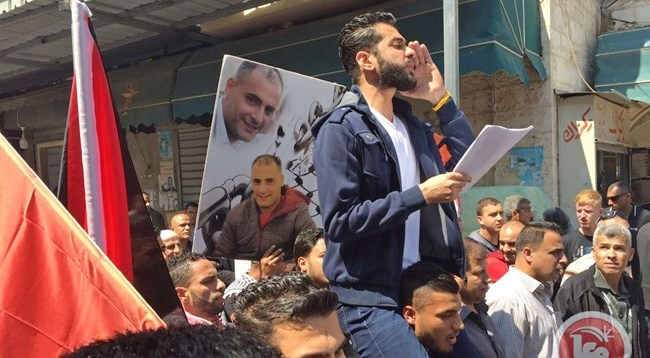 Tulkarem
Tulkarem
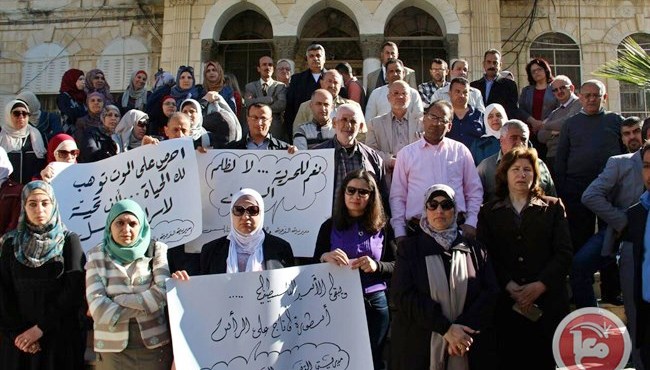
Nablus
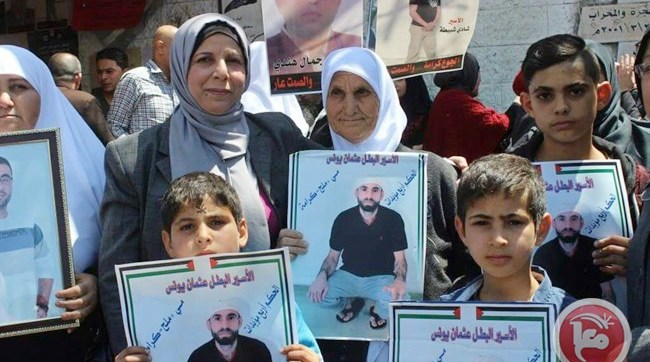
Qalqiliya
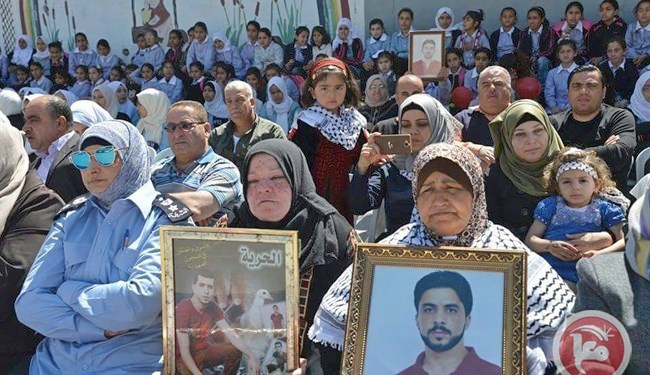 Salfit
Salfit
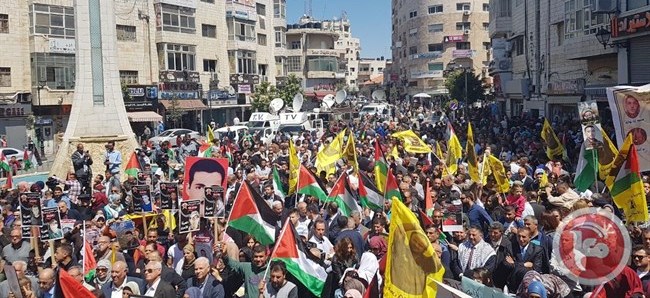
Ramallah

Bethlehem

Hebron
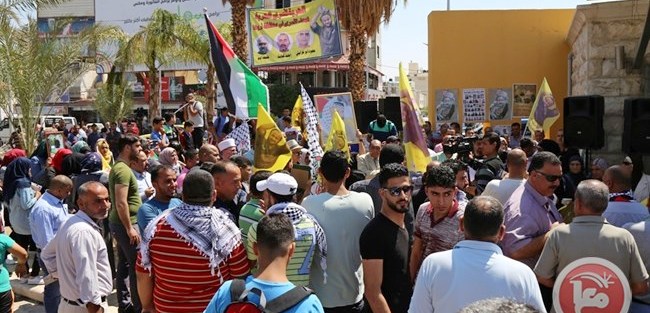
Jericho
Conditions in Israeli Prisons
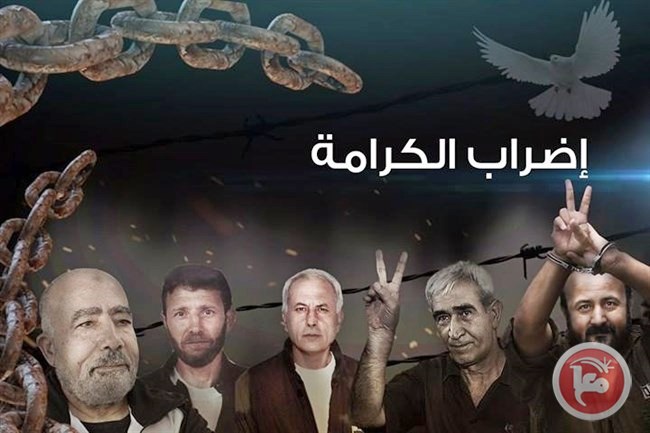
Poster for the "Dignity Strike," depicting some of Palestine's most
high profile prisoners.
L to R: Fouad Shubaki, Nael Barghouthi, Karim Yunis, Ahmad Saadat and
Marwan Barghouthi.
Today, 17 April 2017, marks Palestinian Prisoners' Day. Over 6,500 Palestinian and Arab prisoners have been detained in the Israeli jails and detention centers under cruel and inhumane conditions.
The Palestinians [have commemorated] this day since 1979, supporting the cause of prisoners detained in the Israeli jails, as it marks the anniversary of the first prisoner released in the first prisoners' exchange deal between the Palestinians and the Israeli occupation on 17 April 1974.
This occasion comes at a time whilst the suffering of the Palestinian prisoners in the Israeli prisons has exacerbated due to the Israeli violations and punitive measures taken against them. These prisoners are regularly subject to cruel, inhuman or degrading treatment, including torture; denial of family visitation; [strip] search; night raids; solitary confinement; medical negligence; denial of education under a decision issued by the Israeli Prison Service on 20 July 2011[1]; applying the force-feeding law against prisoners on hunger strike[2]; in addition to other violations falling within the Israeli policy against Palestinian prisoners.
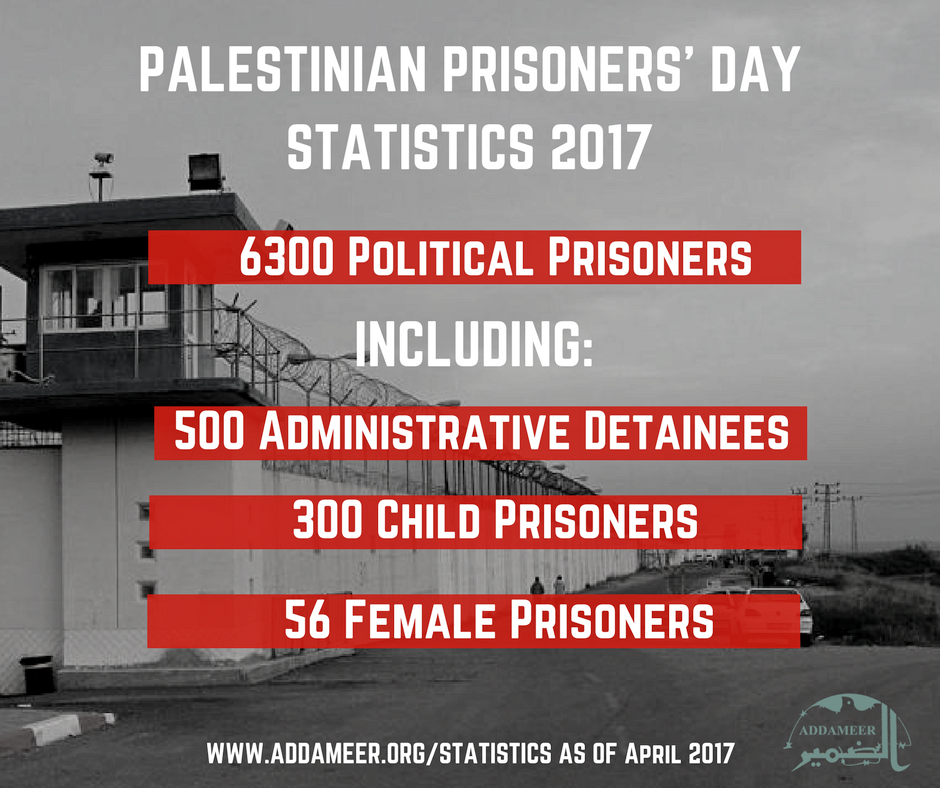
The Palestinian prisoners
in the Israeli jails declared today [they are] moving to the hardest
choice, which is starting a hunger strike until their minimum human
demands are met. Statistics available at the Palestinian Center for
Human Rights (PCHR) shows, that about 1,500 prisoners in a number of
prisons and detention facilities have declared [they are] starting a
hunger strike claiming a number of human demands, the most prominent of
which are, inter alia, putting an end to the solitary confinement
policy, offering medication to sick prisoners, constant communication
with their families, ending arbitrary and degrading measures against
female prisoners, receiving magazines and newspapers [always] and the
right to education.
It is expected that other prisoners would join them in their hunger strike which was described as a rolling strike.
Furthermore, data and statistics available at PCHR indicate that over 6,500 Palestinian prisoners have been detained in 22 prisons and detention facilities, the majority of which are located in Israel in a clear violation of article 76 of the Fourth Geneva Convention that obliges Israel to detain the prisoners of the occupied country in their country until they serve their sentences therein. The majority of the prisoners are from the West Bank, including 57 women and 300 children. Moreover, the number of sick prisoners reached about 1,800, including 180 suffering from serious illnesses and 26 having cancer.
The Israeli authorities continued to place 500 under administrative detention in the Israeli prisons, including 15 members of the Palestinian Legislative Council (PLC) and former ministers, in a clear violation of their right to fair trial and right to receive adequate defense and be informed of the charges against them. The violation of the right to fair trial is part of the administrative detention policy implemented without a court ruling in a way that violates the fair judicial procedure.
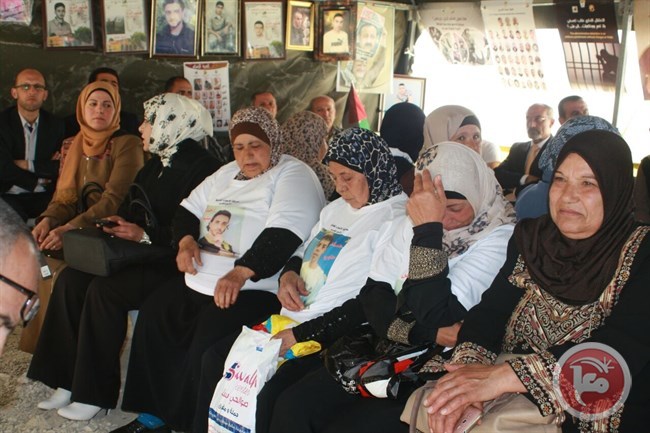
Prisoners' families begin solidarity hunger strike in Salfit,
Palestine,
April 18, 2017.
PCHR, on this day, draws attention to the increasing violations committed against the Palestinian prisoners and the poor conditions under which they live in view of the Israeli authorities' insistence on violating the rules of international humanitarian law and principles of human rights to which Israel is a state party. PCHR further highlights that the international community's silence encourages the commission of more violations without accountability.
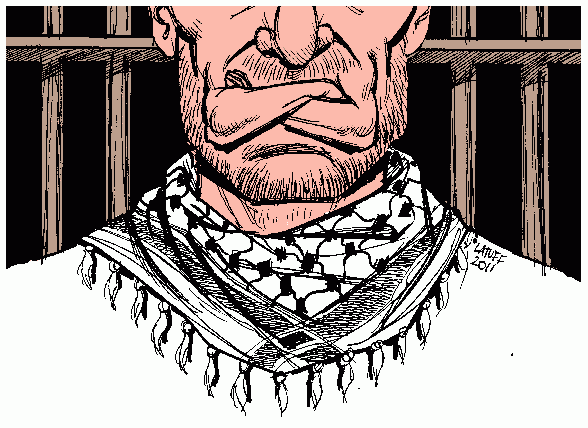 Since it was established,
PCHR has been following up on the prisoners' cause, offering them and
their families the legal aid they need, working on unveiling the
Israeli violations, and calling upon:
Since it was established,
PCHR has been following up on the prisoners' cause, offering them and
their families the legal aid they need, working on unveiling the
Israeli violations, and calling upon:
- The High Contracting Parties to the 1949 Fourth
Geneva
Convention to fulfill their obligations;
- The international human
rights organizations to follow up the Palestinian prisoners'
cause and rally international support to pressure Israel to
stop all its arbitrary practices against the Palestinian
prisoners;
- The European countries to activate Article 2 of the
EU-Israel Association Agreement, which provides that Israel
should respect human rights as a precondition for economic
cooperation; and
- The UN bodies, International Committee of the
Red Cross and international community to pressure Israel to
improve the detention conditions of the Palestinian prisoners,
stop torture and open prisons to observers until prisoners are
released.
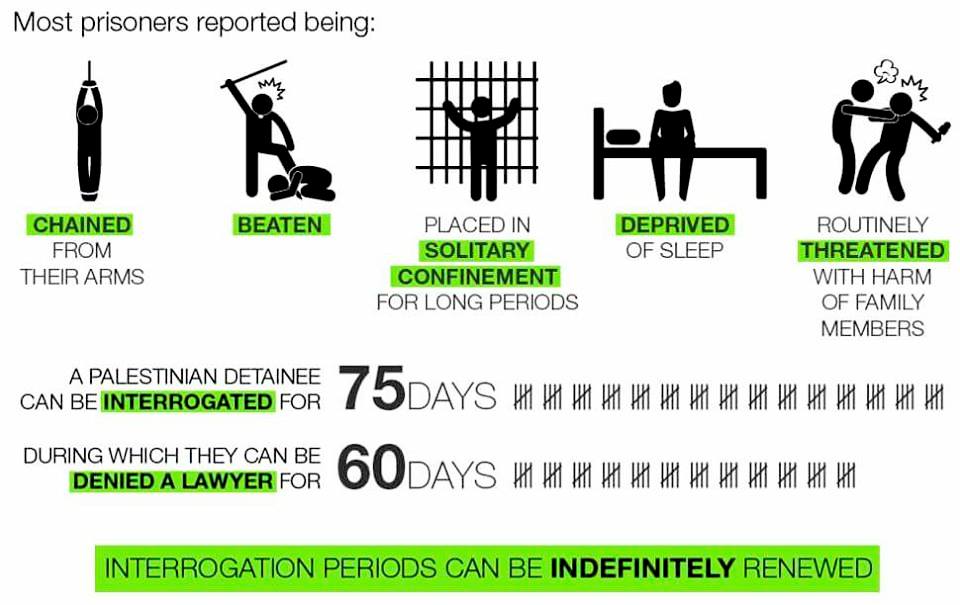
Notes
1. See PCHR's website, press release no. 70/2011 issued on 21 July 2011, PCHR Condemns Punitive Measures against Palestinian Prisoners in Israeli Jails.
2. On 30 July 2015, the Israeli Knesset approved in the second and third reading the amendment to the so-called "Law to Prevent Harm of Hunger Strike." On 12 January 2016, Israeli forces force-fed Journalist Mohammed al-Qeeq, who had been on hunger strike for about 50 days.
Presidential Election in Ecuador
Citizens' Revolution Prevails over Oligarchy
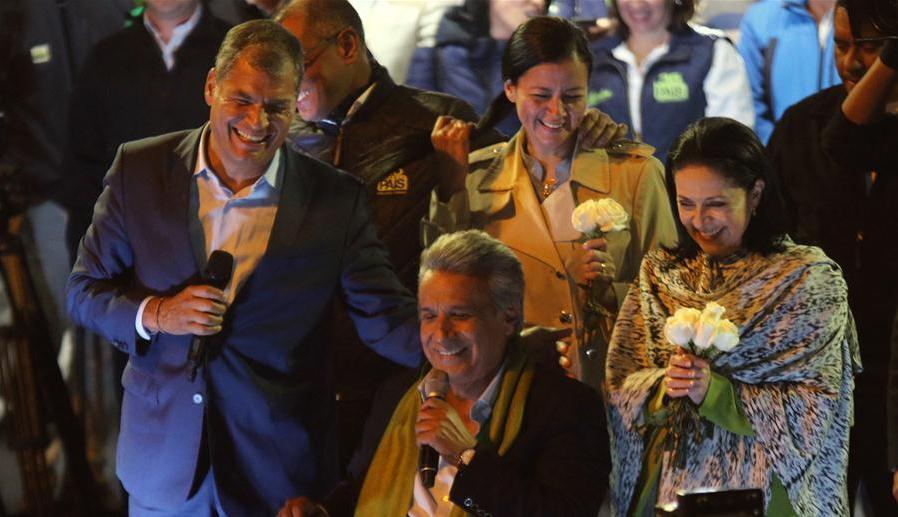
Lenín Moreno, (centre) following his win in Ecuadorian
presidential election. (Xinhua)
Lenín Moreno prevailed in the second round of votes in the Ecuadorian presidential election on April 2. Moreno won with 51 per cent of the vote to 49 per cent for Guillermo Lasso, a banker. Nearly 12.5 million Ecuadorians in the country cast a vote (nearly 80 per cent of eligible voters) along with almost 400,000 overseas citizens.
Moreno is known for fighting for the rights of people with disabilities and is former UN Special Envoy for Disability and Accessibility and former Vice-President of Ecuador with the Alliance PAIS party of outgoing President Rafael Correa. According to reports, Moreno is the first paraplegic head of state. The new administration will be inaugurated on May 24.
Moreno pledged to continue the expansion of social programs, pro-social policies and stand in defence of the sovereignty of the peoples of Latin America and the Caribbean that characterized the past ten years of Ecuador's Citizens' Revolution and the Correa presidency. This has led to more than one million people being lifted out of poverty and greatly expanded public health care and education.
President Correa said of the results, "The revolution
has
triumphed again in Ecuador. The right has lost, despite its
millions and its media." Ecuadorian Foreign Minister Guillaume
Long stated that the result "is a positive endorsement of our
plan to create a more equal Ecuador. We have made great strides
in social progress in the past decade and we will now continue to
do so for the next four years."
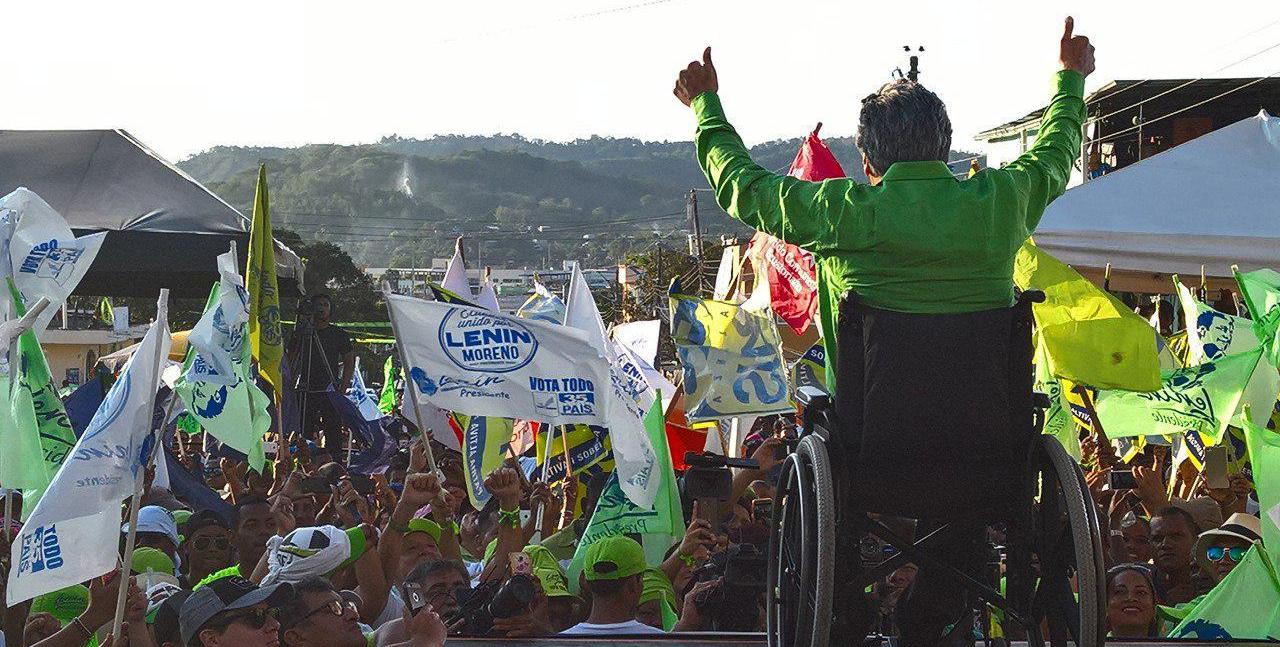
Moreno campaigns during presidential election, February 2017.
Moreno's election is a defeat for the U.S. imperialists and local oligarchy. Both hoped to follow the constitutional coup in Brazil and electoral coup in Argentina against progressive forces with a takeover of Ecuador, a member of the Bolivarian Alliance for the Peoples of Our Americas (ALBA) and leading country in other mechanisms for regional cooperation such as the Community of Latin American and Caribbean States (CELAC) and Union of South American Nations (UNASUR). Brazil and Argentina have since been used as players in the U.S. imperialist attacks against the Bolivarian Republic of Venezuela through the Organization of American States and other organizations.
Venezuelan President Nicolás Maduro said of the victory, "Conscious of the importance of the historic moment, the Ecuadorian people dealt a strategic, continent-wide blow to the powers that be, led by the [U.S.] State Department, which have once again failed in their obsessive attempt to destabilize the progressive governments in the region." Cuban President Raúl Castro congratulated Moreno on the victory, stating that it will "initiate a new stage of the Citizens' Revolution and will continue the commitment of this sister nation to the unity and defense of the sovereignty of Our America."
TML Weekly congratulates Lenín Moreno and the people of Ecuador for prevailing at a time when the imperialists have stepped up their efforts to undo all the achievements of the peoples of Latin America and the Caribbean, first and foremost the affirmation of sovereignty. Consolidating the Citizens' Revolution in Ecuador is an important contribution to defending the peoples of the continent and their movements.
(With files from TeleSUR.)
Website: www.cpcml.ca Email: editor@cpcml.ca
